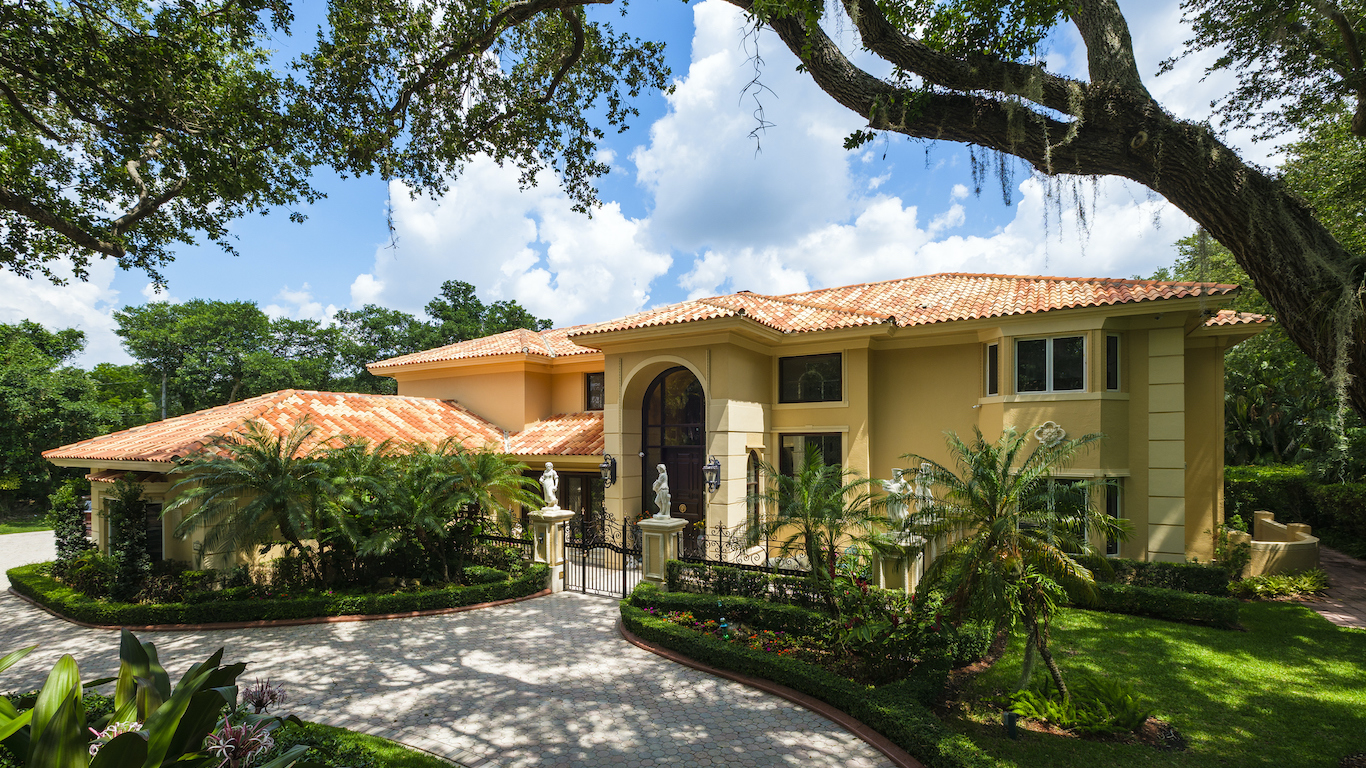
American incomes in 2019 reached an all-time high, with the median household income rising to $65,712. While incomes vary widely from state to state, many have at least one major city in which residents tend to be far wealthier than average.
Using data from the Census Bureau’s 2019 American Community Survey, 24/7 Wall St. identified America’s richest city in every state. We considered all 621 U.S. cities, towns, villages, municipalities, and Census designated places with available data. Vermont, West Virginia, and Wyoming have no cities covered in the latest Census release and were excluded from the analysis.
Supplemental data on median home value, the percentage of adults age 25 and older with at least a bachelor’s degree, and unemployment also came from the ACS.
Many of the cities on this list are located within commuting distance of much larger cities and the wider variety of high-paying jobs available there. Another common characteristic in these cities is education. Areas with higher levels of educational attainment tend to have higher incomes, as workers with college degrees are more likely to have high-paying, secure jobs. Nationwide, the typical college-educated worker earns $56,344 a year, well above the median earnings of $41,801 for all workers. Often, the wealthiest city in a given state is also the most educated. This is the most educated city in every state.
The cities on this list also tend to have lower than average annual unemployment rates. However, the economic situation in each of these cities looks very different today than in 2019, when the data was collected, due in large part to the COVID-19 pandemic. The monthly unemployment rate for August 2020 is often more than double what it was a year earlier. With fewer people working, median household incomes have likely decreased as well. These are the cities with the worst COVID-19 unemployment crisis right now.
Click here to see the richest city in every state
Click here to read our methodology
Alabama: Hoover
> Median household income: $98,689 (state: $51,734)
> Households earning more than $200,000: 17.0% (state: 4.3%)
> Median home value: $322,000 (state: $154,000)
> Adults with a bachelor’s degree: 56.9% (state: 26.3%)
> 2019 unemployment rate: 3.7% (state: 4.9%)
> Population: 85,772
Hoover, a city of about 86,000 residents located just south of Birmingham, ranks as the wealthiest city in Alabama. Incomes in the city climbed substantially last year. As recently as 2018, the median household income in Hoover was $88,899, about $10,000 lower than in 2019.
As is often the case in the cities on this list, not only is Hoover in close proximity to a much larger city and the wide range of jobs available there, but it is also home to a well-educated population. In Hoover, 56.9% of adults have a bachelor’s degree or higher, compared with just 26.3% of adults across Alabama as a whole.
[in-text-ad]

Alaska: Anchorage
> Median household income: $82,716 (state: $75,463)
> Households earning more than $200,000: 10.2% (state: 9.3%)
> Median home value: $314,600 (state: $281,200)
> Adults with a bachelor’s degree: 36.3% (state: 30.2%)
> 2019 unemployment rate: 5.4% (state: 5.8%)
> Population: 288,000
Anchorage is the only city in Alaska for which the Census’s American Community Survey has 2019 data, and it ranks as the richest city in the state by default only. Still, the typical household in the city earns an income of $82,716 a year — over $7,000 more than the typical Alaska household.
As is often the case in the cities on this list, Anchorage is home to a relatively well-educated population. Over one-third of all adults in the city have a bachelor’s degree or higher, compared to 30.2% of all adults in Alaska.
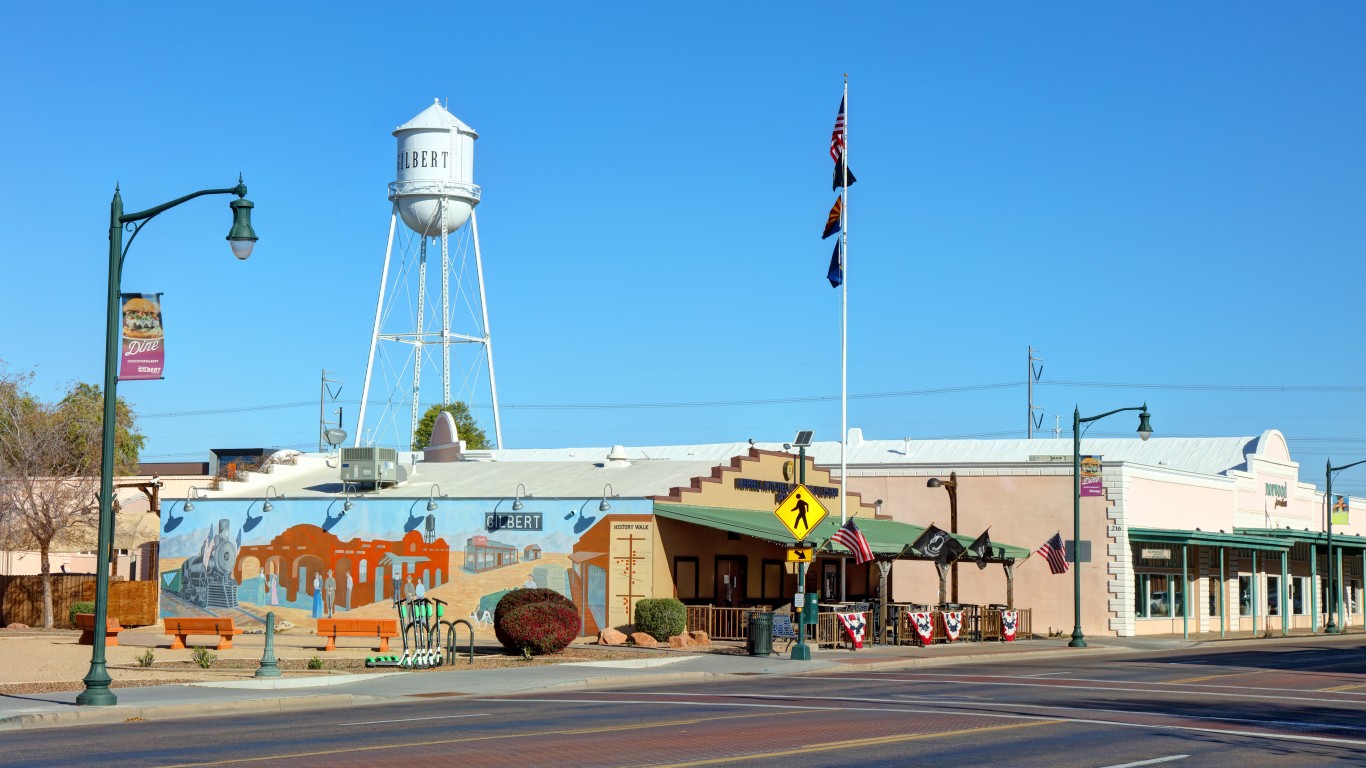
Arizona: Gilbert
> Median household income: $102,793 (state: $62,055)
> Households earning more than $200,000: 12.6% (state: 6.6%)
> Median home value: $372,500 (state: $255,900)
> Adults with a bachelor’s degree: 46.8% (state: 30.2%)
> 2019 unemployment rate: 3.4% (state: 5.1%)
> Population: 254,115
Gilbert is the only city or town in Arizona where most households earn six-figure incomes. The typical Gilbert household earns an income of $102,793 a year, nearly $41,000 more than the median household income across Arizona as a whole. Additionally, 12.6% of households in Gilbert earn $200,000 or more per year, well above the 6.6% share of households across all of Arizona.
Like many other places on this list, Gilbert is within commuting distance to a much larger urban area. Phoenix, Arizona’s capital and largest city, is less than 30 miles west of Gilbert.
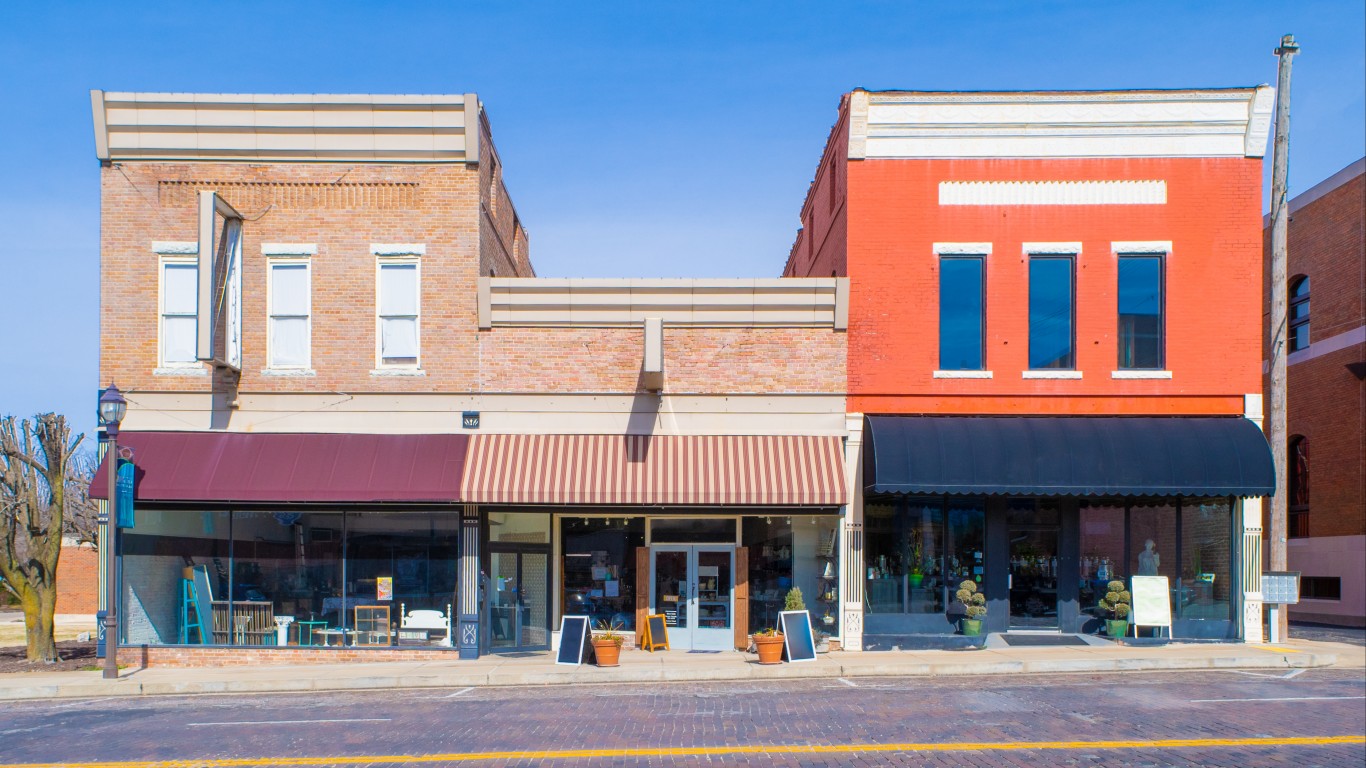
Arkansas: Rogers
> Median household income: $65,823 (state: $48,952)
> Households earning more than $200,000: 9.5% (state: 3.8%)
> Median home value: $214,100 (state: $136,200)
> Adults with a bachelor’s degree: 34.1% (state: 23.3%)
> 2019 unemployment rate: N/A (state: 4.8%)
> Population: 68,674
With a median household income of just $48,952, Arkansas is one of the poorest states in the country. Even in Rogers, the city with the highest income in the state, the typical household earns $65,823 — in line with the median household income across the U.S as a whole of $65,712.
Still, serious financial hardship is not as common in the state’s wealthiest city as it is across the U.S. The poverty rate in Rogers stands at 9.9%, considerably lower than the 12.3% national poverty rate. For context, 16.2% of all Arkansas residents live below the poverty line.
[in-text-ad-2]

California: San Ramon
> Median household income: $189,185 (state: $80,440)
> Households earning more than $200,000: 47.6% (state: 13.7%)
> Median home value: $1,089,700 (state: $568,500)
> Adults with a bachelor’s degree: 71.7% (state: 35.0%)
> 2019 unemployment rate: 3.5% (state: 5.1%)
> Population: 75,984
San Ramon, a suburb of San Francisco, is not only the wealthiest city in California, but also the United States. The typical area household earns an income of $189,185 annually, compared to the median household income across the state of $80,440 and the national median of $65,712.
The area’s high incomes are partly the result of the types of employers operating in close proximity to the city. Both San Francisco and nearby Silicon Valley are tech and finance hubs — two industries that are traditionally high paying.

Colorado: Highlands Ranch
> Median household income: $132,836 (state: $77,127)
> Households earning more than $200,000: 23.7% (state: 10.3%)
> Median home value: $519,000 (state: $394,600)
> Adults with a bachelor’s degree: 65.1% (state: 42.7%)
> 2019 unemployment rate: 2.5% (state: 3.7%)
> Population: 99,810
Highlands Ranch is a Census designated place located about 15 miles south of downtown Denver. With a median annual household income of $132,836, it is the wealthiest community in Colorado. Additionally, 23.7% of area households earn $200,000 or more annually, more than double the 8.5% share of all households nationwide.
As is often the case in the cities and towns on this list, Highlands Ranch residents are far less likely than most Americans to be unemployed. According to the Census, the average unemployment rate in the area in 2019 was just 2.5% — well below the 3.7% statewide rate and 4.5% national rate.
[in-text-ad]

Connecticut: Stamford
> Median household income: $100,713 (state: $78,833)
> Households earning more than $200,000: 20.4% (state: 13.2%)
> Median home value: $565,100 (state: $280,700)
> Adults with a bachelor’s degree: 53.3% (state: 39.8%)
> 2019 unemployment rate: 4.5% (state: 5.3%)
> Population: 129,636
Stamford is the only city in Connecticut where most households have an income of more than $100,000 a year. Additionally, more than one in every five households earn $200,000 or more per year. The city is located along the Long Island Sound and is only about an hour drive from midtown Manhattan — providing residents access to jobs in the largest metropolitan area in the country.
Not only is Stamford the wealthiest city in Connecticut, but it is also the best educated. Of all residents 25 and older, 53.3% have a bachelor’s degree or higher — well above the 39.8% share of adults in Connecticut and 33.1% share of all adults nationwide.

Delaware: Wilmington
> Median household income: $47,722 (state: $70,176)
> Households earning more than $200,000: 3.4% (state: 7.4%)
> Median home value: $174,400 (state: $261,700)
> Adults with a bachelor’s degree: 29.0% (state: 33.2%)
> 2019 unemployment rate: 7.3% (state: 4.6%)
> Population: 70,164
Delaware is a small state, and Wilmington is the only city in its borders for which the Census ACS has 2019 data. Therefore, it ranks as the richest city in the state by default only. In fact, the typical Wilmington household earns just $47,722 a year, well below the median annual household income across the state of $70,176.
Due in part to lower incomes, Wilmington residents are more likely to rely on government support to afford basic needs. An estimated 23.7% of households in the city received SNAP benefits in 2019, compared to the statewide recipiency rate of 10.1%.
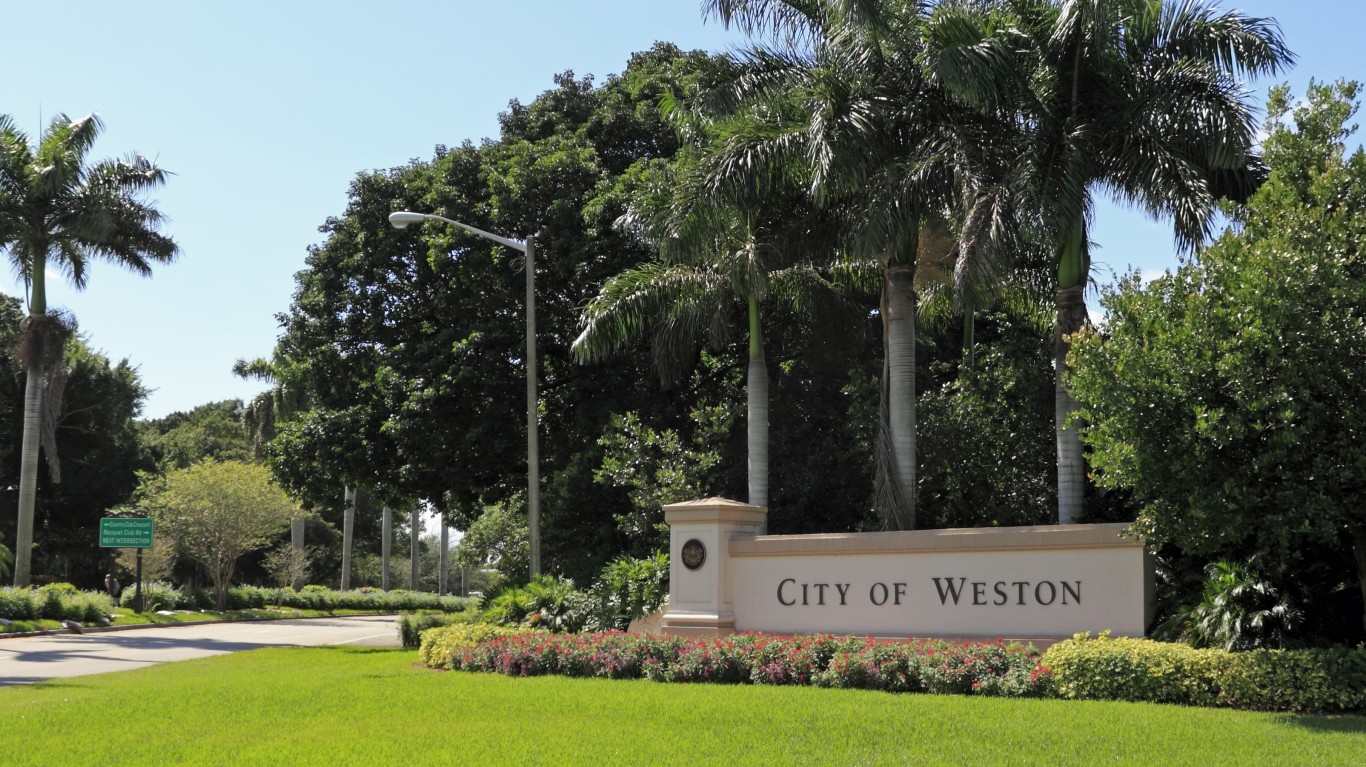
Florida: Weston
> Median household income: $125,105 (state: $59,227)
> Households earning more than $200,000: 29.9% (state: 6.7%)
> Median home value: $494,700 (state: $245,100)
> Adults with a bachelor’s degree: 62.7% (state: 30.7%)
> 2019 unemployment rate: N/A (state: 4.5%)
> Population: 71,164
The Miami suburb of Weston is a planned community and the only city in Florida where most households have an income of over $100,000 a year.
Property values often mirror what local residents can afford, and in Weston, housing is expensive. The typical home in the area is worth about half a million dollars, roughly double the median home value across the state as a whole of $245,100.
[in-text-ad-2]

Georgia: Johns Creek
> Median household income: $151,773 (state: $61,980)
> Households earning more than $200,000: 30.8% (state: 7.3%)
> Median home value: $437,200 (state: $202,500)
> Adults with a bachelor’s degree: 69.6% (state: 32.5%)
> 2019 unemployment rate: N/A (state: 4.8%)
> Population: 84,590
The typical household of Johns Creek earns an income of more than $150,000, more than double the median household income for the state of Georgia. At $437,200, houses in this suburb northeast of Atlanta are also more than twice as expensive as houses statewide.
Workers with a college degree typically earn higher wages than those without. In Johns Creek, nearly seven out of 10 residents 25 and older hold at least a bachelor’s degree, more than double the state and national bachelor’s degree attainment rates.

Hawaii: Urban Honolulu
> Median household income: $72,943 (state: $83,102)
> Households earning more than $200,000: 10.1% (state: 10.9%)
> Median home value: $754,700 (state: $669,200)
> Adults with a bachelor’s degree: 38.6% (state: 33.6%)
> 2019 unemployment rate: 3.8% (state: 3.9%)
> Population: 345,055
Honolulu is the only city in Hawaii for which the Census ACS has 2019 data, and it ranks as the richest city in the state by default only. In fact, the typical Honolulu household has an income of $72,943 a year, well below the median income across the state of $83,102. Despite lower incomes overall, Honolulu residents are not necessarily more likely than the typical Hawaiian to face serious financial hardship. The city’s poverty rate of 9.4% is inline with the 9.3% statewide rate.
Additionally, although Honolulu’s median household income is lower than the state as a whole, it is well above the $65,712 national median.
[in-text-ad]
Idaho: Meridian
> Median household income: $75,515 (state: $60,999)
> Households earning more than $200,000: 5.9% (state: 5.0%)
> Median home value: $331,600 (state: $255,200)
> Adults with a bachelor’s degree: 39.0% (state: 28.7%)
> 2019 unemployment rate: N/A (state: 3.3%)
> Population: 114,161
Meridian, Idaho, located just outside of Boise, has a median household income of $75,515 — nearly $15,000 higher than Idaho’s median household income and about $10,000 higher than the U.S. median.
Meridian does not have a much higher share of households earning more than $200,000 when compared to Idaho, at 5.9% compared to 5.0%. Yet its residents are much less likely to struggle financially as the city’s poverty rate is 8.5%, well below the 11.2% state rate and 12.3% national rate.
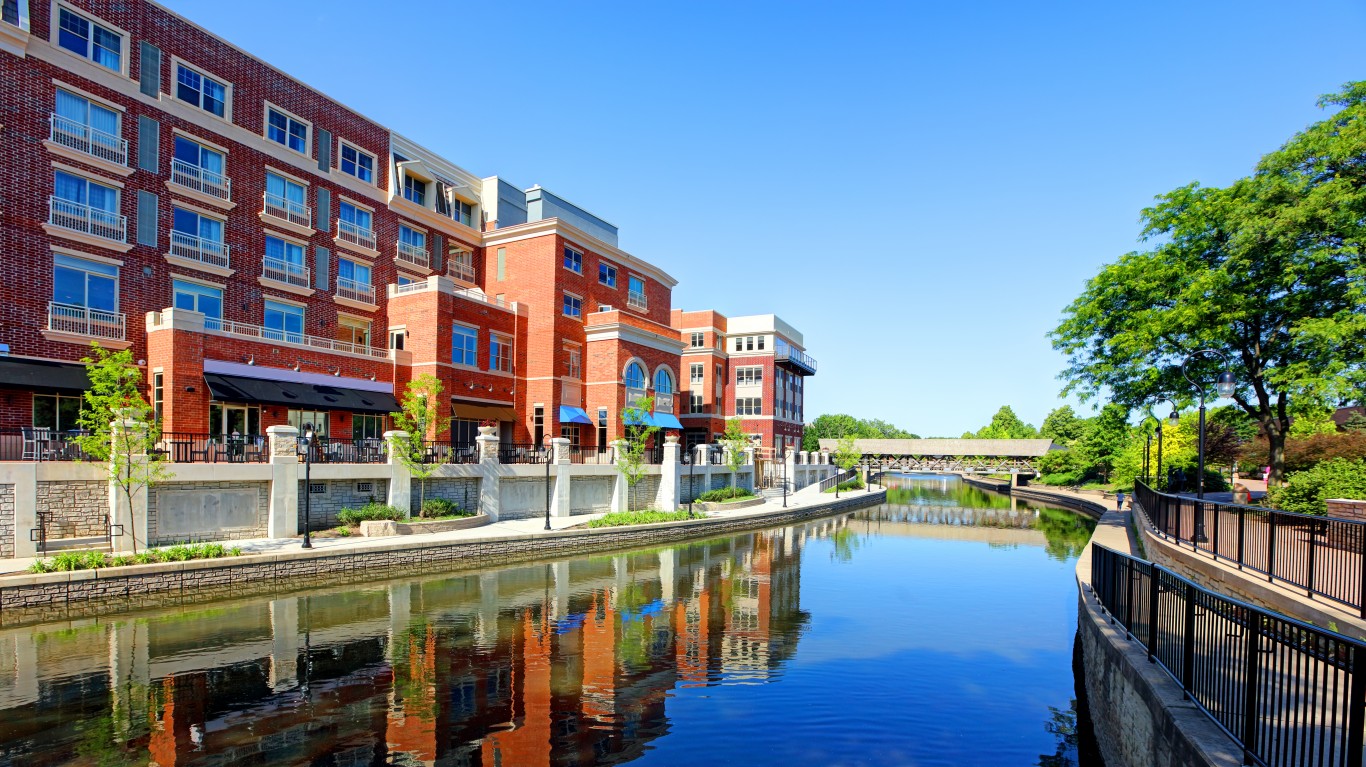
Illinois: Naperville
> Median household income: $140,061 (state: $69,187)
> Households earning more than $200,000: 28.1% (state: 9.0%)
> Median home value: $423,000 (state: $209,100)
> Adults with a bachelor’s degree: 69.1% (state: 35.8%)
> 2019 unemployment rate: 3.1% (state: 4.8%)
> Population: 149,640
The Chicago suburb of Naperville not only ranks as the richest place in Illinois, but also one of the richest in the entire country. Most area households earn over $140,000 annually — more than double the state median and well above the median household income in any of Illinois’ 18 other qualifying cities.
As is the case with the majority of wealthy cities, Naperville residents are less likely to face significant economic struggles. Just 3.7% live below the poverty line, compared to 11.5% of Illinois residents and 12.3% of Americans.
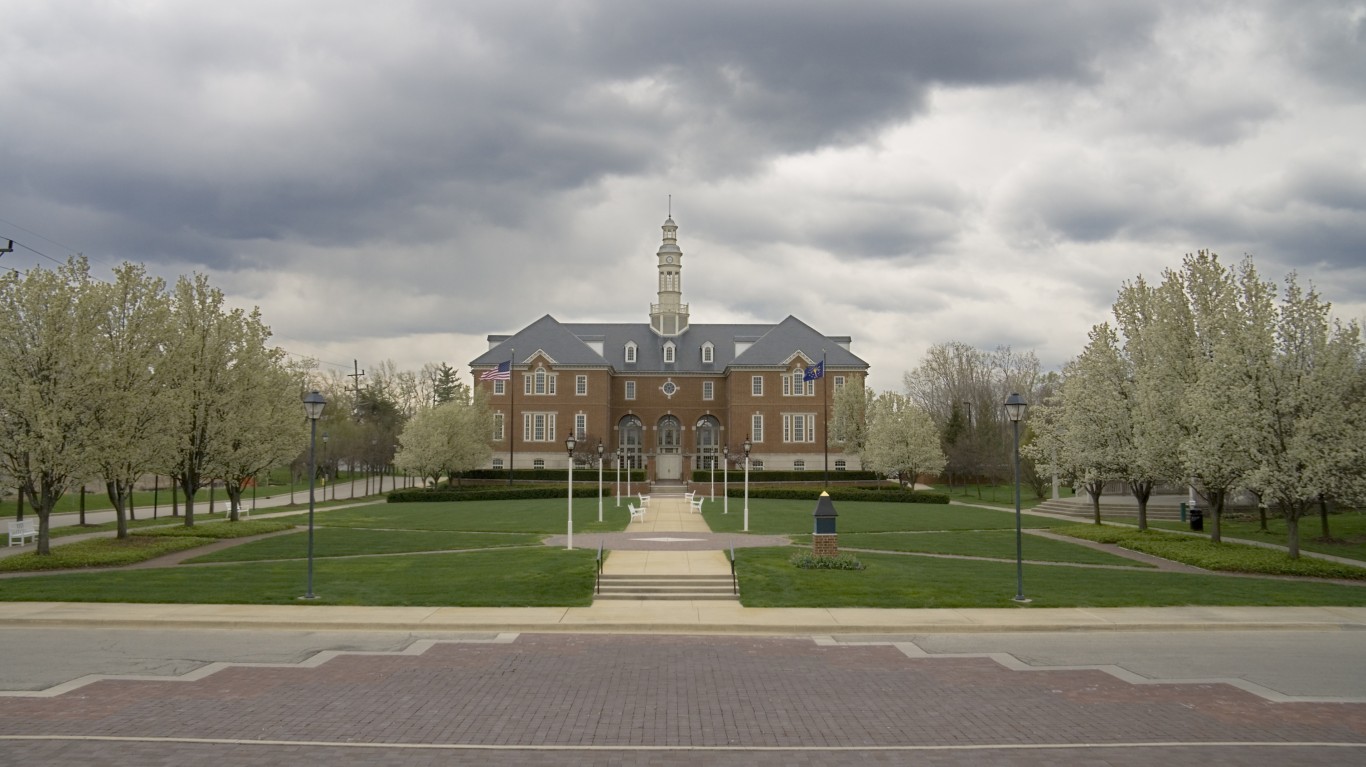
Indiana: Carmel
> Median household income: $113,714 (state: $57,603)
> Households earning more than $200,000: 26.8% (state: 4.7%)
> Median home value: $370,400 (state: $156,000)
> Adults with a bachelor’s degree: 75.4% (state: 26.9%)
> 2019 unemployment rate: 2.9% (state: 4.2%)
> Population: 101,918
Carmel is located just north and well within commuting distance of Indianapolis, the state’s capital and largest city. Median household income in the city is $113,714, nearly double the median of $57,603 across the state as a whole. Like most high-income American cities, Carmel has a well-educated population. More than three in every four adults in the city have a bachelor’s degree, compared to only about one in every four adults across the state as a whole.
[in-text-ad-2]

Iowa: Ankeny
> Median household income: $94,862 (state: $61,691)
> Households earning more than $200,000: 7.7% (state: 5.0%)
> Median home value: $237,100 (state: $158,900)
> Adults with a bachelor’s degree: 53.5% (state: 29.3%)
> 2019 unemployment rate: N/A (state: 3.7%)
> Population: 67,347
In Ankeny, Iowa, the wealthiest city in the state, incomes climbed substantially between 2018 and 2019. Median household income in the Des Moines suburb stands at $94,862, up from $76,072 in 2018.
As is often the case in affluent cities, a relatively small share of Ankeny residents depend on government assistance to afford basic necessities. Just 4.0% of the population receives SNAP benefits, less than half the 9.5% statewide recipiency rate.
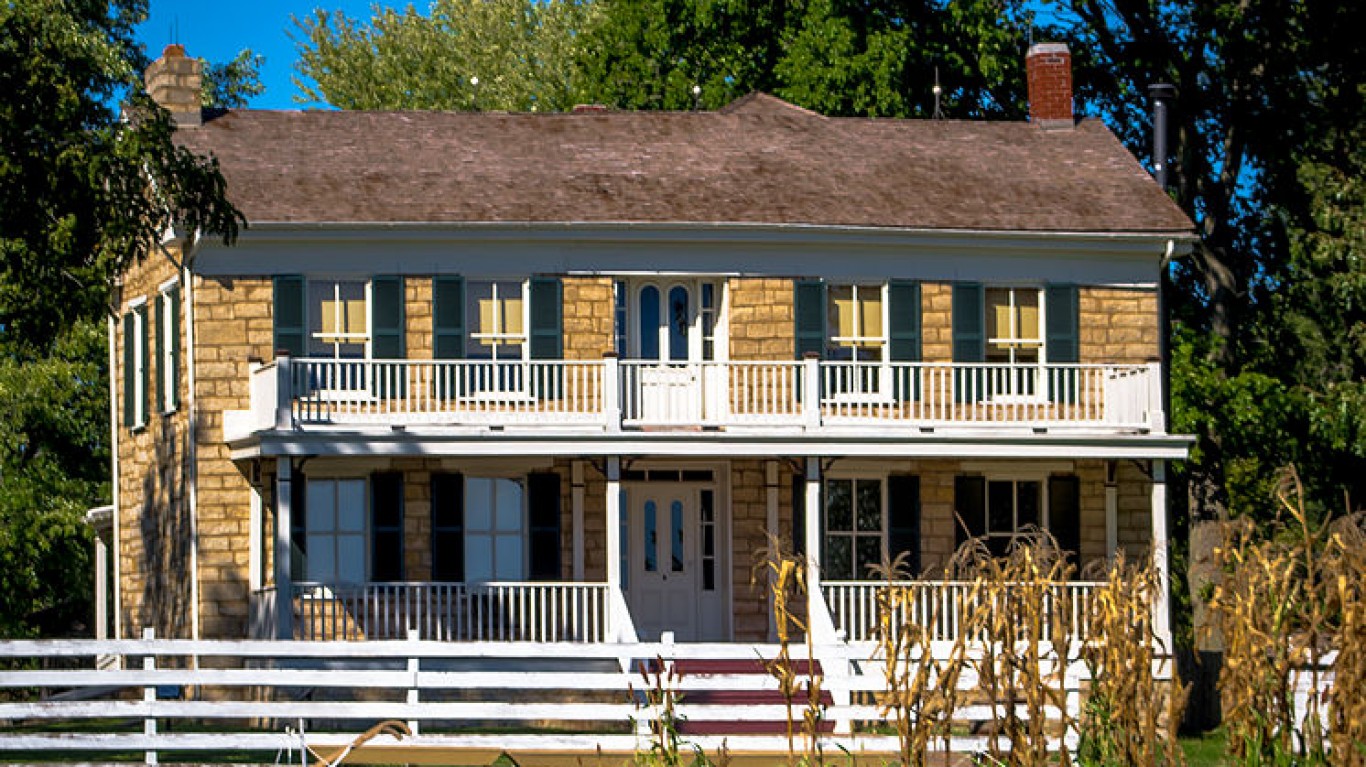
Kansas: Olathe
> Median household income: $94,292 (state: $62,087)
> Households earning more than $200,000: 10.6% (state: 5.9%)
> Median home value: $273,400 (state: $163,200)
> Adults with a bachelor’s degree: 48.5% (state: 34.0%)
> 2019 unemployment rate: 2.7% (state: 3.8%)
> Population: 140,557
Olathe is the wealthiest city in Kansas, narrowly edging out several other Kansas City-area cities like Overland Park and Shawnee. The median household income in Olathe of $94,292 is more than $32,000 higher than the state median.
Like many of the other cities on this list, Olathe residents are more likely to hold a college degree than residents across the state. Nearly half of all adults 25 and older, 48.5%, hold at least a bachelor’s degree. Across Kansas, 34.0% of adults that age hold such a degree.
[in-text-ad]
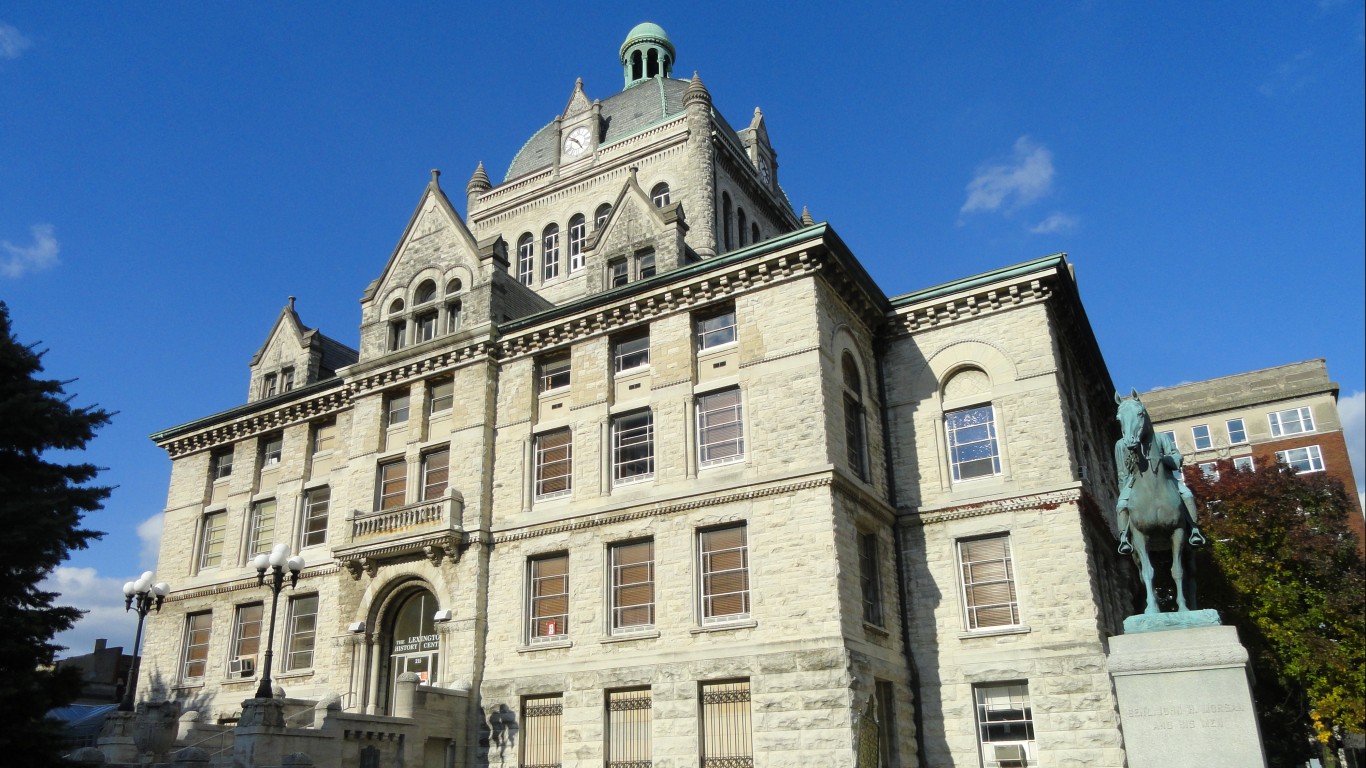
Kentucky: Lexington-Fayette
> Median household income: $58,356 (state: $52,295)
> Households earning more than $200,000: 6.4% (state: 4.1%)
> Median home value: $211,400 (state: $151,700)
> Adults with a bachelor’s degree: 45.0% (state: 25.1%)
> 2019 unemployment rate: 5.3% (state: 4.8%)
> Population: 323,152
Kentucky is a relatively poor state. Most Kentucky households earn less than $53,000 a year. Even in the state’s wealthiest city, the combined Lexington-Fayette urban area, the median household income of $58,356 is lower than the median income of $65,712 across the U.S. as a whole.
The low median income is due in part to a relatively weak job market. In 2019, before the novel coronavirus ushered in the worst unemployment crisis in modern history, an average of 5.3% of Lexington-Fayette’s labor force were out of work, compared to the Census’s 4.5% national unemployment rate the same year.

Louisiana: Metairie
> Median household income: $60,404 (state: $51,073)
> Households earning more than $200,000: 5.9% (state: 5.0%)
> Median home value: $246,600 (state: $172,100)
> Adults with a bachelor’s degree: 35.5% (state: 25.0%)
> 2019 unemployment rate: 3.6% (state: 5.5%)
> Population: 130,427
Metairie is a Census designated place located just outside of New Orleans. The wealthiest city in Louisiana, Metairie’s median annual household income of $60,404 is nearly $9,000 higher than the statewide median. Still, Louisiana is largely a relatively poor state, and even its wealthiest city’s median household income is about $5,000 lower than the $65,712 national median.
Similarly, Metairie residents are less likely to face serious financial hardship than the typical Louisiana resident, but more likely than the typical American. The city’s poverty rate stands at 15.1% — compared to the 19.0% state rate and the 12.3% national rate.

Maine: Portland
> Median household income: $61,779 (state: $58,924)
> Households earning more than $200,000: 8.2% (state: 5.2%)
> Median home value: $334,200 (state: $200,500)
> Adults with a bachelor’s degree: 57.4% (state: 33.2%)
> 2019 unemployment rate: 3.1% (state: 3.5%)
> Population: 66,218
Portland is the only city in Maine for which the Census ACS has 2019 data, and it ranks as the richest city in the state by default only. Still, the typical household in the city earns an income of $61,779 a year — about $3,000 more than the typical Maine household.
As is often the case in the cities on this list, Portland is home to a relatively well-educated population. Over half of all adults in the city have a bachelor’s degree or higher, compared to about one-third of all adults in Maine.
[in-text-ad-2]
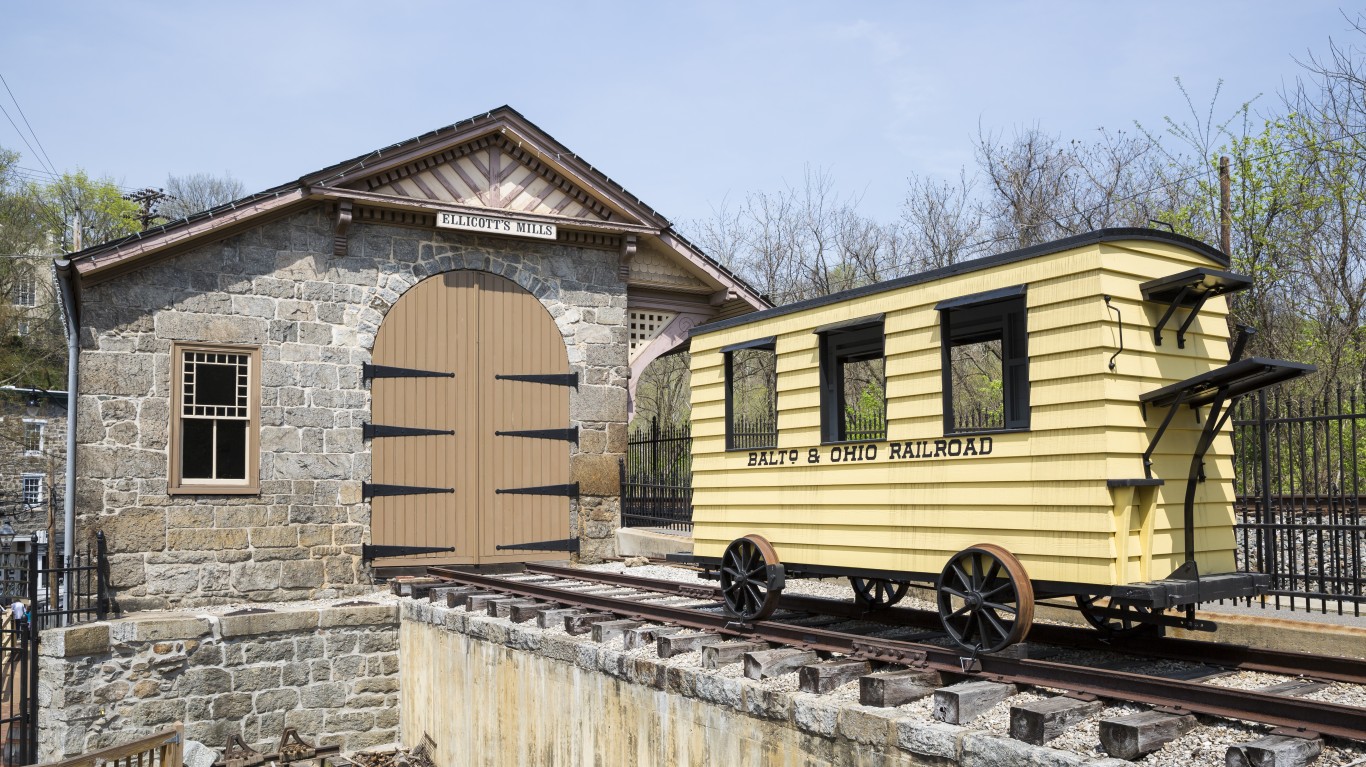
Maryland: Ellicott City
> Median household income: $130,930 (state: $86,738)
> Households earning more than $200,000: 29.9% (state: 13.6%)
> Median home value: $557,900 (state: $332,500)
> Adults with a bachelor’s degree: 71.1% (state: 40.9%)
> 2019 unemployment rate: 3.5% (state: 4.5%)
> Population: 72,605
With a median household income of $86,738, Maryland ranks as the wealthiest state in the country. In Ellicott City, the wealthiest city in Maryland, most households earn over $130,000 a year, and about 30% of all households earn $200,000 or more.
Real estate values are often a reflection of what local residents can afford, and in the Baltimore suburb of Ellicott City, most homes are worth more than $557,000. For reference, across the state, the typical home is worth $332,500, and nationwide, the median home value is $240,500.

Massachusetts: Newton
> Median household income: $150,106 (state: $85,843)
> Households earning more than $200,000: 37.8% (state: 14.6%)
> Median home value: $944,200 (state: $418,600)
> Adults with a bachelor’s degree: 81.1% (state: 45.0%)
> 2019 unemployment rate: 1.9% (state: 3.9%)
> Population: 88,411
Newton, Massachusetts, is a Boston suburb of about 88,000 residents. With a median household income of $150,106, it is the wealthiest city in the state. Incomes tend to rise with educational attainment, and in Newton, 81.1% of adults have a bachelor’s degree or higher, compared to 45.0% of adults across the state and 33.1% of adults nationwide.
Newton residents are also far less likely than the typical American to face serious financial trouble. Just 5.6% of the local population lives below the poverty line, compared to 9.4% of state residents and 12.3% of the U.S. population.
[in-text-ad]
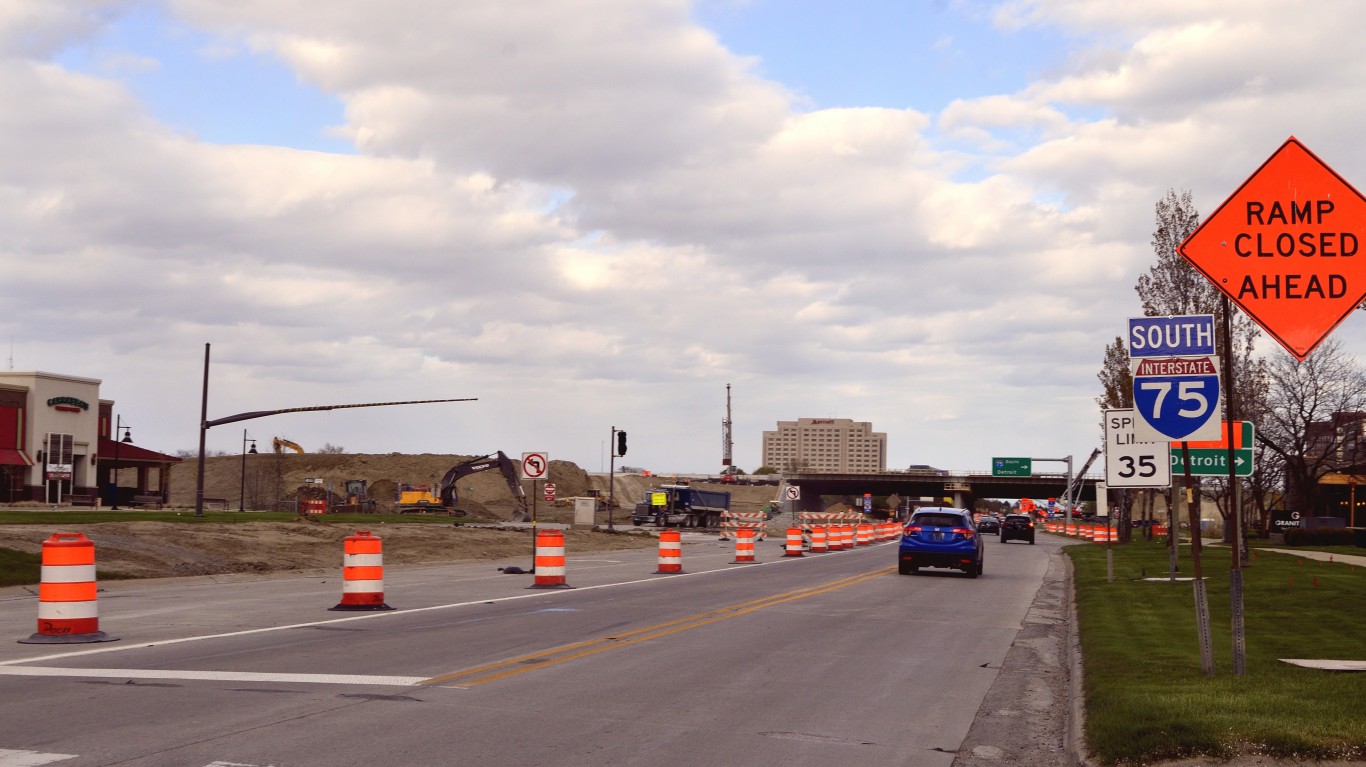
Michigan: Troy
> Median household income: $110,909 (state: $59,584)
> Households earning more than $200,000: 16.5% (state: 5.7%)
> Median home value: $343,500 (state: $169,600)
> Adults with a bachelor’s degree: 64.3% (state: 30.0%)
> 2019 unemployment rate: 3.8% (state: 5.0%)
> Population: 84,087
Troy, the wealthiest city in Michigan, is located only about 20 miles from Detroit, one of the poorest cities in the state. The typical Troy household earns $110,909 a year, far more than the median household income across Michigan of $59,584 and more than triple the median of $33,965 in Detroit.
Troy’s relatively high median income is partially attributable to low unemployment. Just 3.8% of the local labor force was out of work in 2019, compared to 5.0% of workers across Michigan as a whole.

Minnesota: Lakeville
> Median household income: $117,083 (state: $74,593)
> Households earning more than $200,000: 17.4% (state: 8.5%)
> Median home value: $344,800 (state: $246,700)
> Adults with a bachelor’s degree: 51.3% (state: 37.3%)
> 2019 unemployment rate: N/A (state: 3.2%)
> Population: 67,326
Minnesota is a relatively wealthy state. The typical Minnesota household earns an income of $74,593 a year, about $9,000 more than the typical American household. There are also four cities in the state in which the median household income is over $100,000 a year. The Minneapolis suburb of Lakeville has the highest median household income of them all, at $117,083. Additionally, the 17.4% share of Lakeville households earning $200,000 or more per year is more than double the 8.5% share statewide.

Mississippi: Jackson
> Median household income: $38,972 (state: $45,792)
> Households earning more than $200,000: 2.4% (state: 3.2%)
> Median home value: $91,100 (state: $128,200)
> Adults with a bachelor’s degree: 27.0% (state: 22.3%)
> 2019 unemployment rate: 9.3% (state: 6.6%)
> Population: 160,532
Of the two cities in Mississippi with 2019 Census data, Jackson is the wealthiest. The typical Jackson household earns $38,972 a year, compared to the median income of $36,013 in the city of Gulfport. Still, incomes are lower in Jackson than they are across the state as a whole, where the median household income is $45,792.
The lower than average incomes in Jackson are partially attributable to a lack of jobs. The city’s 9.3% annual unemployment rate is well above the overall unemployment rate across Mississippi of 6.6%.
[in-text-ad-2]
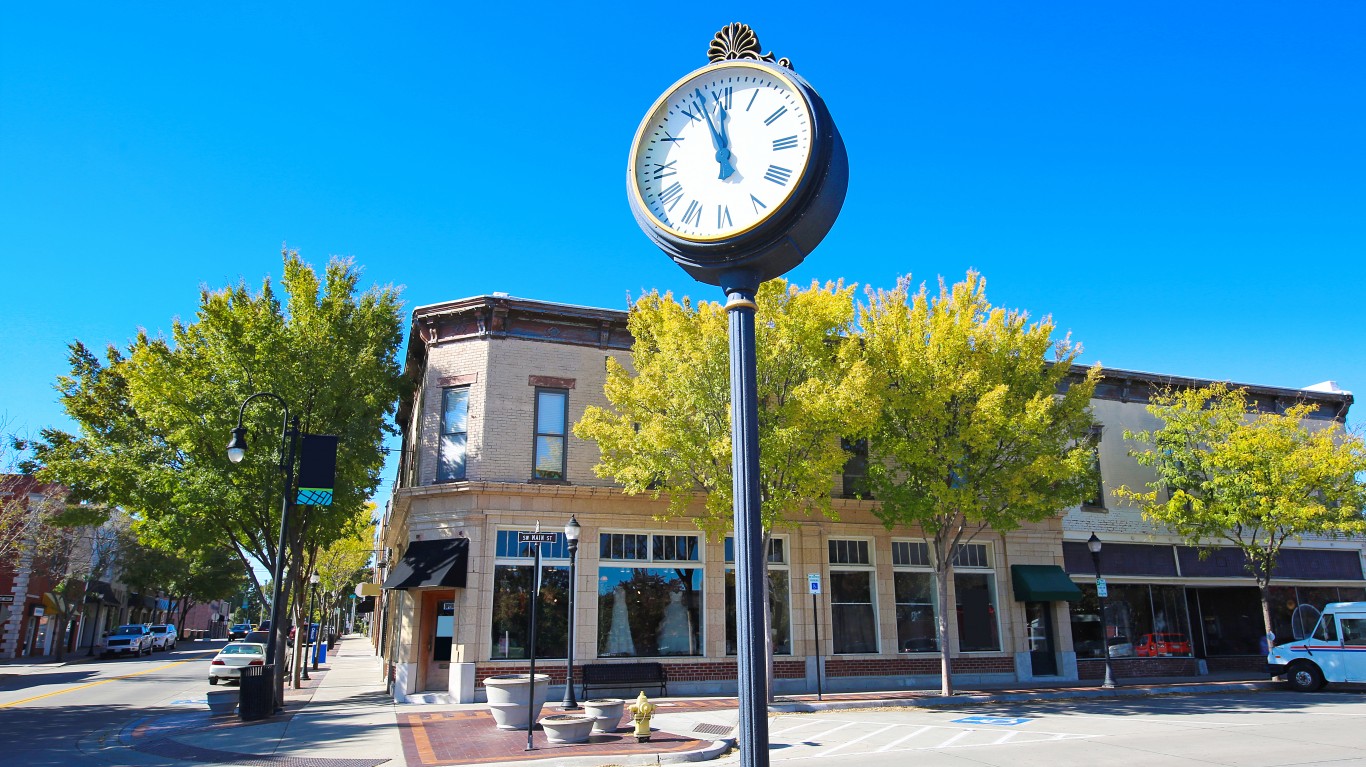
Missouri: Lee’s Summit
> Median household income: $106,912 (state: $57,409)
> Households earning more than $200,000: 11.7% (state: 5.1%)
> Median home value: $245,700 (state: $168,000)
> Adults with a bachelor’s degree: 50.3% (state: 30.2%)
> 2019 unemployment rate: 3.0% (state: 3.8%)
> Population: 99,290
Lee’s Summit, a suburb of Kansas City, is the wealthiest city in Missouri. It is the only city in the state where most households have an income of over $100,000 a year. The higher incomes mean residents can afford more expensive housing. In Lee’s Summit, the typical home is worth nearly a quarter of a million dollars — about $78,000 more than the median home value across Missouri.
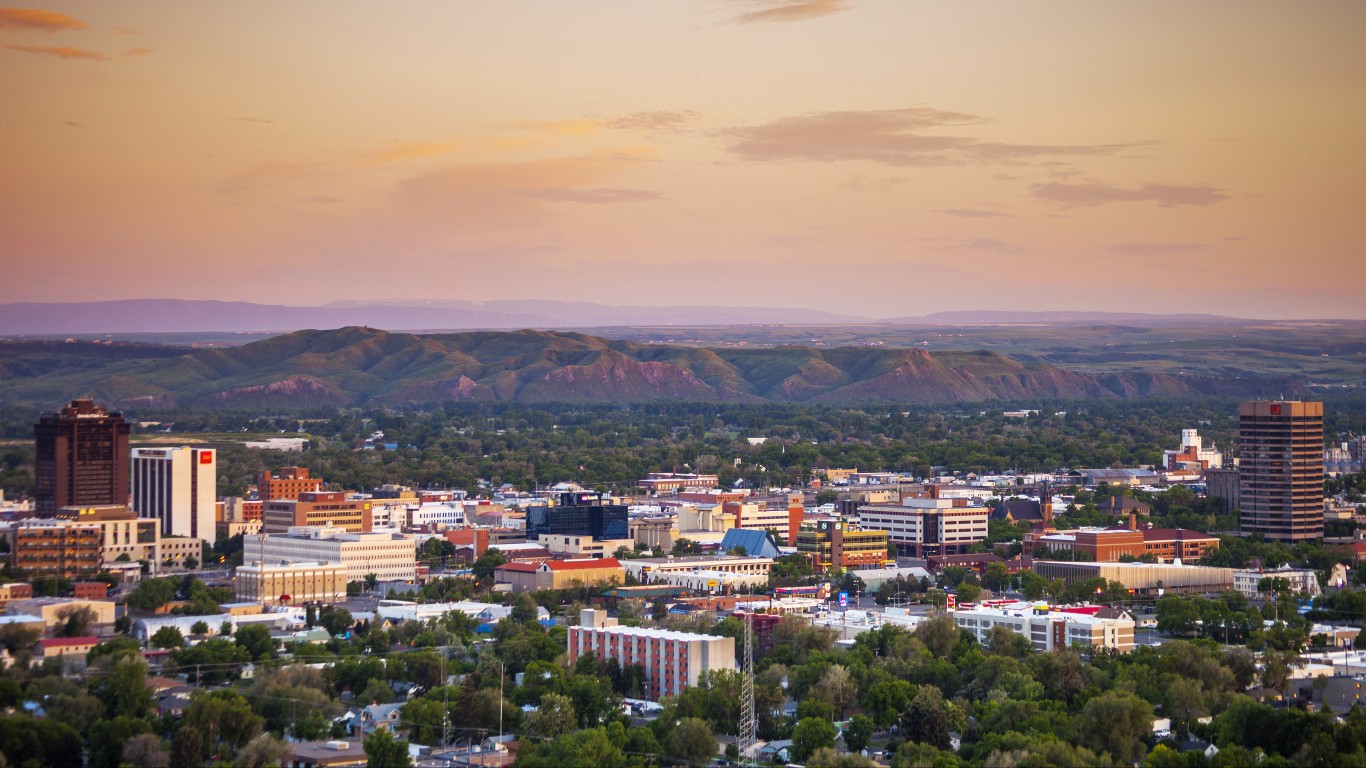
Montana: Billings
> Median household income: $58,394 (state: $57,153)
> Households earning more than $200,000: 5.5% (state: 4.3%)
> Median home value: $232,700 (state: $253,600)
> Adults with a bachelor’s degree: 35.0% (state: 33.6%)
> 2019 unemployment rate: 3.6% (state: 4.1%)
> Population: 109,577
Of the two cities in Montana the Census covered, Billings and Missoula, Billings ranks as the wealthiest. The typical Billings household earns $58,394 a year, compared to the median income of $50,194 in Missoula and the statewide median household income of $57,153.
The relatively high incomes in Billings are partially due to job availability in the area. Just 3.6% of the local labor force was unemployed in 2019, a smaller share than the 4.1% share of workers across the state, and well below the 6.2% unemployment rate in Missoula the same year.
[in-text-ad]

Nebraska: Omaha
> Median household income: $61,305 (state: $63,229)
> Households earning more than $200,000: 5.8% (state: 5.4%)
> Median home value: $175,800 (state: $172,700)
> Adults with a bachelor’s degree: 39.7% (state: 33.2%)
> 2019 unemployment rate: 4.7% (state: 3.3%)
> Population: 478,203
Nebraska is home to two major cities with populations of at least 65,000 — Omaha and Lincoln. Yet neither has a median household income higher than Nebraska’s median of $63,229. But because Omaha’s median household income of $61,305 is about $2,000 higher than Lincoln’s, it is Nebraska’s wealthiest city.
Omaha may have a lower median household income than Nebraska in part because of the area’s relatively high unemployment rate. Of the area’s labor force, 4.7% are unemployed, compared to 3.3% of Nebraska’s labor force and 4.5% of the American labor force overall.

Nevada: Enterprise
> Median household income: $85,795 (state: $63,276)
> Households earning more than $200,000: 7.8% (state: 6.4%)
> Median home value: $362,300 (state: $317,800)
> Adults with a bachelor’s degree: 32.6% (state: 25.7%)
> 2019 unemployment rate: 4.1% (state: 5.1%)
> Population: 191,871
Enterprise is a Census designated place just south of Las Vegas. It ranks as the wealthiest city in Nevada with a median household income more than $20,000 higher than the state and national medians. Enterprise has a relatively high share of wealthy households when compared to the rest of the state, with 7.8% of its households earning $200,000 or more annually. Yet this still trails the U.S. rate of 8.5% of households earning at least that amount in 2019.
Nevada has among the lowest educational attainment rates of all states, as just 25.7% of adults 25 and older have a bachelor’s degree or higher. In Enterprise, 32.6% of adult residents have finished college, nearly in line with the comparable U.S. attainment rate. Incomes tend to rise with education level.
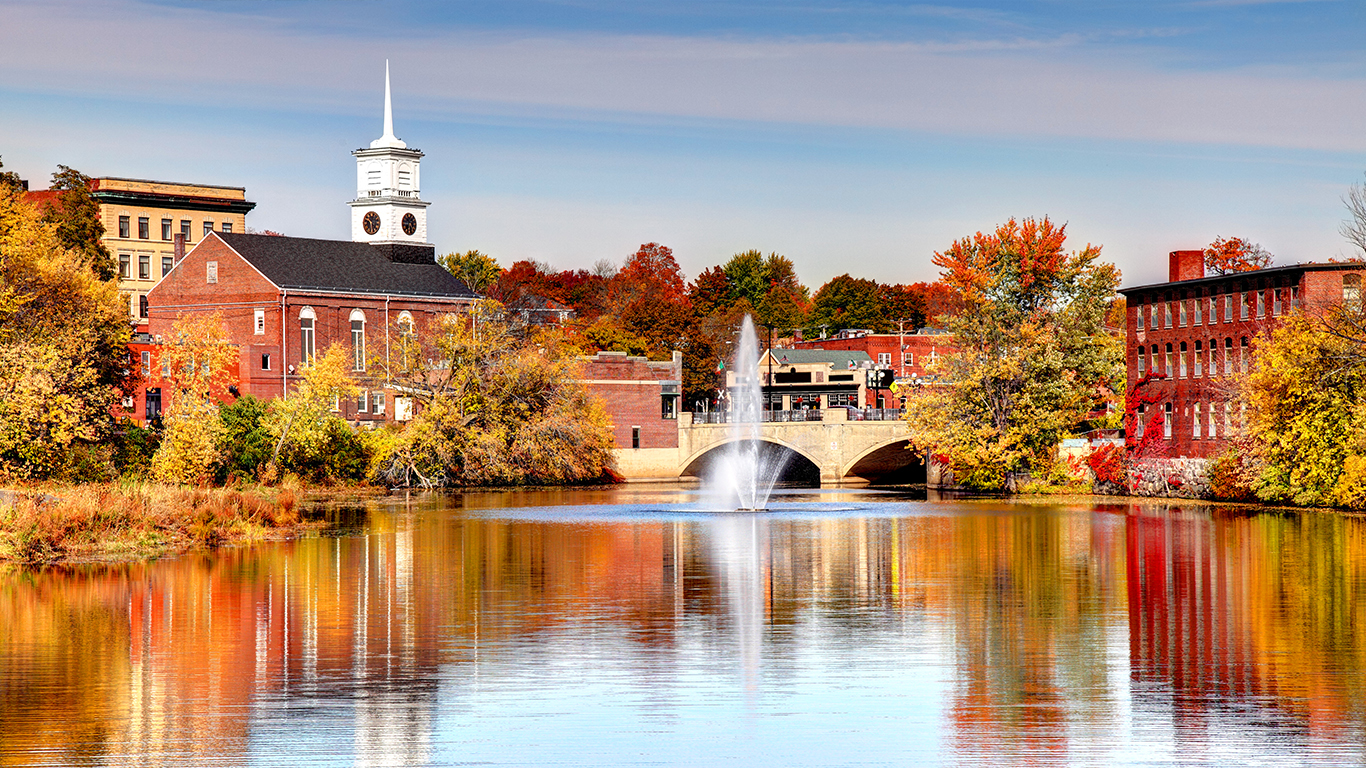
New Hampshire: Nashua
> Median household income: $78,284 (state: $77,933)
> Households earning more than $200,000: 7.7% (state: 9.8%)
> Median home value: $285,900 (state: $281,400)
> Adults with a bachelor’s degree: 36.8% (state: 37.6%)
> 2019 unemployment rate: 4.8% (state: 3.0%)
> Population: 89,356
With a median household income of $78,284 annually, Nashua ranks as the wealthiest city in New Hampshire. In Manchester, the other city in the state covered by the Census’s 2019 ACS, the typical household earns $64,162 a year.
New Hampshire is a relatively high-income state. Across the state as a whole, the typical household earns $77,933, only a few hundred dollars less than the median income in its wealthiest city and over $12,000 more than the national median.
[in-text-ad-2]

New Jersey: Clifton
> Median household income: $84,804 (state: $85,751)
> Households earning more than $200,000: 8.7% (state: 15.2%)
> Median home value: $365,400 (state: $348,800)
> Adults with a bachelor’s degree: 32.0% (state: 41.2%)
> 2019 unemployment rate: 5.3% (state: 4.7%)
> Population: 85,053
In most states, the wealthiest city has a median household income well above the median across the state as a whole. New Jersey, one of the wealthiest states in the country, is an exception. The typical New Jersey household earns an income of $85,751 per year, about $20,000 more than the typical American household. In Clifton, the wealthiest city in the state, the median income is about $1,000 below the state median.
As is the case in other states where the wealthiest city has a lower median income than the state, wealthier New Jersey residents are more likely to live outside of cities.

New Mexico: Rio Rancho
> Median household income: $74,130 (state: $51,945)
> Households earning more than $200,000: 5.3% (state: 4.5%)
> Median home value: $192,700 (state: $180,900)
> Adults with a bachelor’s degree: 32.5% (state: 27.7%)
> 2019 unemployment rate: 4.7% (state: 5.5%)
> Population: 99,159
Rio Rancho is by far the wealthiest city in New Mexico. The typical household earns $74,130 a year — nearly $15,000 more than in Santa Fe, the next richest city in the state. Rio Rancho residents are among the least likely to fall into the lowest income bracket, not just in New Mexico but the country. Just 2.1% of households in the city lived on an income of $10,000 or less in 2019. Comparatively, 8.3% of New Mexico households and 5.8% of American households lived on that level of income.
Though homes in Rio Rancho are typically over $10,000 more expensive than they are statewide, the median home value of $192,700 is still well below the nationwide median. Across the U.S., the typical home costs just over $240,000.
[in-text-ad]
New York: Brentwood
> Median household income: $100,785 (state: $72,108)
> Households earning more than $200,000: 16.7% (state: 12.1%)
> Median home value: $342,400 (state: $338,700)
> Adults with a bachelor’s degree: 14.3% (state: 37.8%)
> 2019 unemployment rate: 2.9% (state: 4.4%)
> Population: 61,930
Brentwood is a Census designated place located in central Long Island. It is the only city or city equivalent in the state where most households have an income of over $100,000 a year. Less than 50 miles from New York City, Brentwood residents have access to the largest job market in the country. According to Census estimates, only 2.9% of the local labor force was unemployed in 2019, compared to the 4.4% unemployment rate across the state and 4.5% national rate that year.
North Carolina: Cary
> Median household income: $106,304 (state: $57,341)
> Households earning more than $200,000: 19.9% (state: 6.0%)
> Median home value: $397,900 (state: $193,200)
> Adults with a bachelor’s degree: 68.4% (state: 32.3%)
> 2019 unemployment rate: 2.9% (state: 4.6%)
> Population: 171,143
Cary, North Carolina, located just outside of the state capital of Raleigh, is by far the wealthiest city in the state. The typical household in Cary earns $106,304 a year, nearly double the median household income in North Carolina as a whole of $57,341. In Concord, the second wealthiest city in the state, the median household income is $75,578.
Incomes tend to rise with educational attainment, and not only is Cary the wealthiest city in North Carolina, but also the best educated. An estimated 68.4% of the city’s adult population have a bachelor’s degree or higher, compared to the 32.3% of adults across the state as a whole.
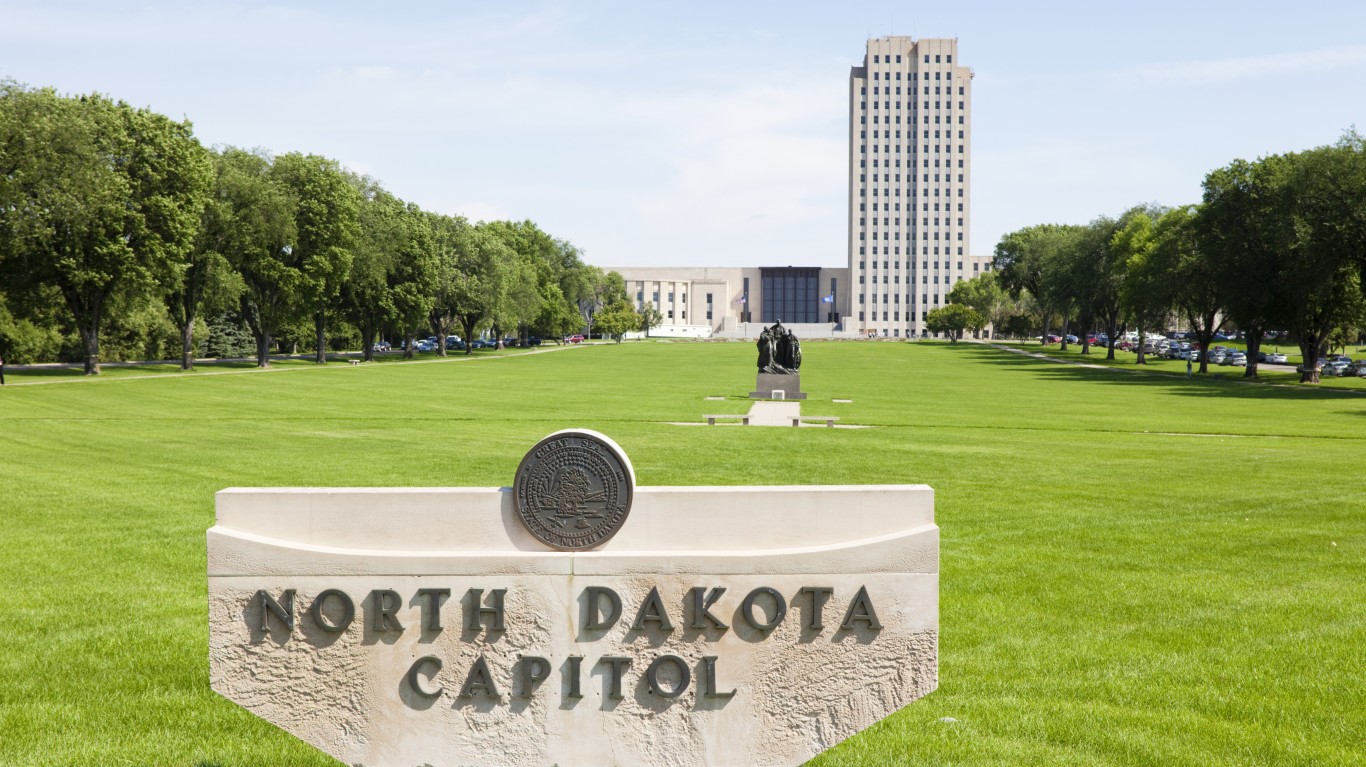
North Dakota: Bismarck
> Median household income: $65,870 (state: $64,577)
> Households earning more than $200,000: 7.4% (state: 6.5%)
> Median home value: $251,600 (state: $205,400)
> Adults with a bachelor’s degree: 35.6% (state: 30.4%)
> 2019 unemployment rate: 5.9% (state: 2.6%)
> Population: 74,632
Bismarck, North Dakota, has a median household income of $65,870 — about $13,000 higher than the median income in Fargo, the only other city in the state covered by the 2019 ACS.
North Dakota is one of a few states where wealth is not heavily concentrated in cities. Though it ranks as the wealthiest city in the state, Bismarck’s median household income is only about $1,300 higher than the median income across the state as a whole.
[in-text-ad-2]
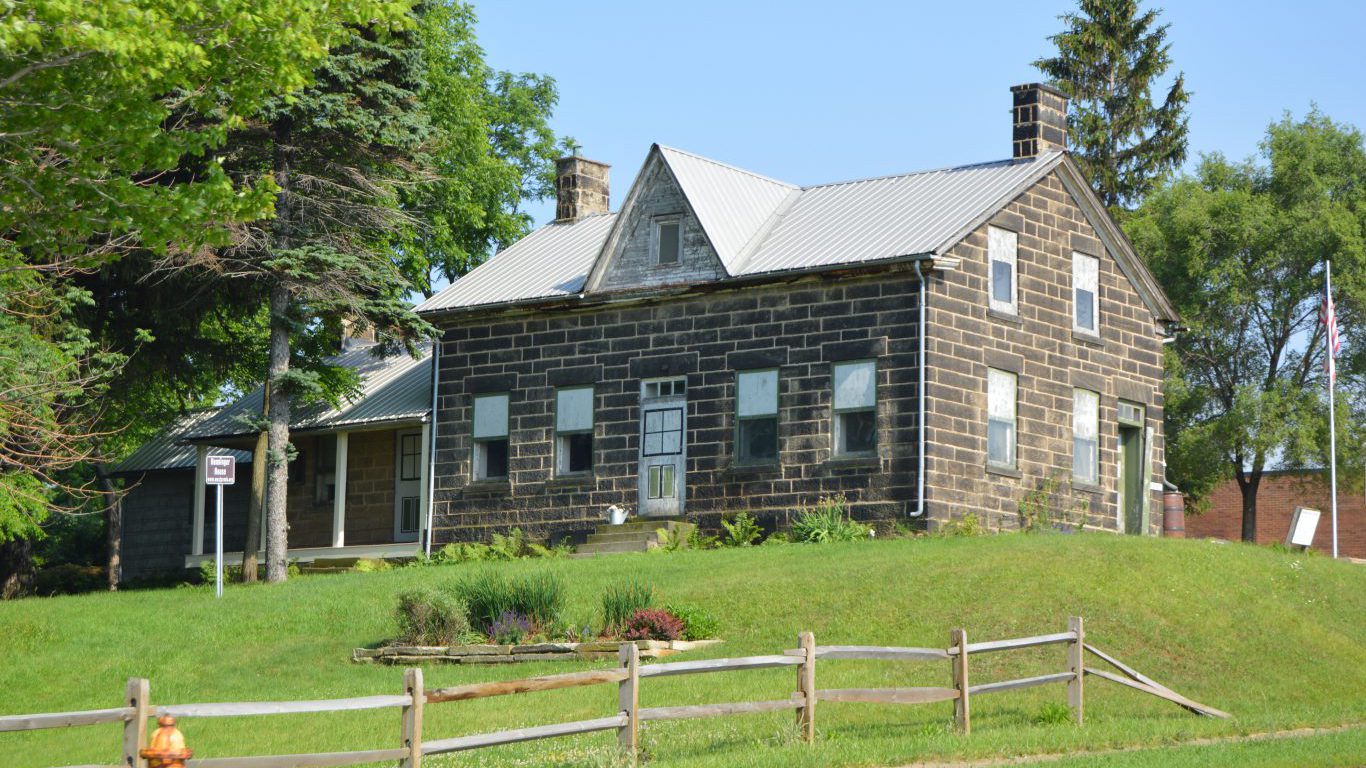
Ohio: Parma
> Median household income: $57,376 (state: $58,642)
> Households earning more than $200,000: 1.0% (state: 5.4%)
> Median home value: $119,600 (state: $157,200)
> Adults with a bachelor’s degree: 21.4% (state: 29.3%)
> 2019 unemployment rate: 5.7% (state: 4.6%)
> Population: 78,093
The typical Ohio household earns $58,642 a year, well below the national median of $65,712. In Parma, the wealthiest city in the state, that typical household earns $57,376 — less than both the national and state medians.
A suburb of Cleveland, Parma is located less than 10 miles from one of the poorest cities in both the state and the country. The typical Cleveland household earns just $32,053 a year.

Oklahoma: Edmond
> Median household income: $88,546 (state: $54,449)
> Households earning more than $200,000: 16.1% (state: 4.7%)
> Median home value: $264,200 (state: $147,000)
> Adults with a bachelor’s degree: 51.4% (state: 26.2%)
> 2019 unemployment rate: 3.9% (state: 4.4%)
> Population: 94,058
Edmond, Oklahoma, located about 15 miles north of Oklahoma City, is the wealthiest city in the state. Most households in Edmond earn over $88,000 a year, compared to the statewide median household income of $54,449. Incomes tend to rise with educational attainment, and Edmond is the best educated city in Oklahoma and the state’s only city in which over half of all adults have a bachelor’s degree or higher.
[in-text-ad]
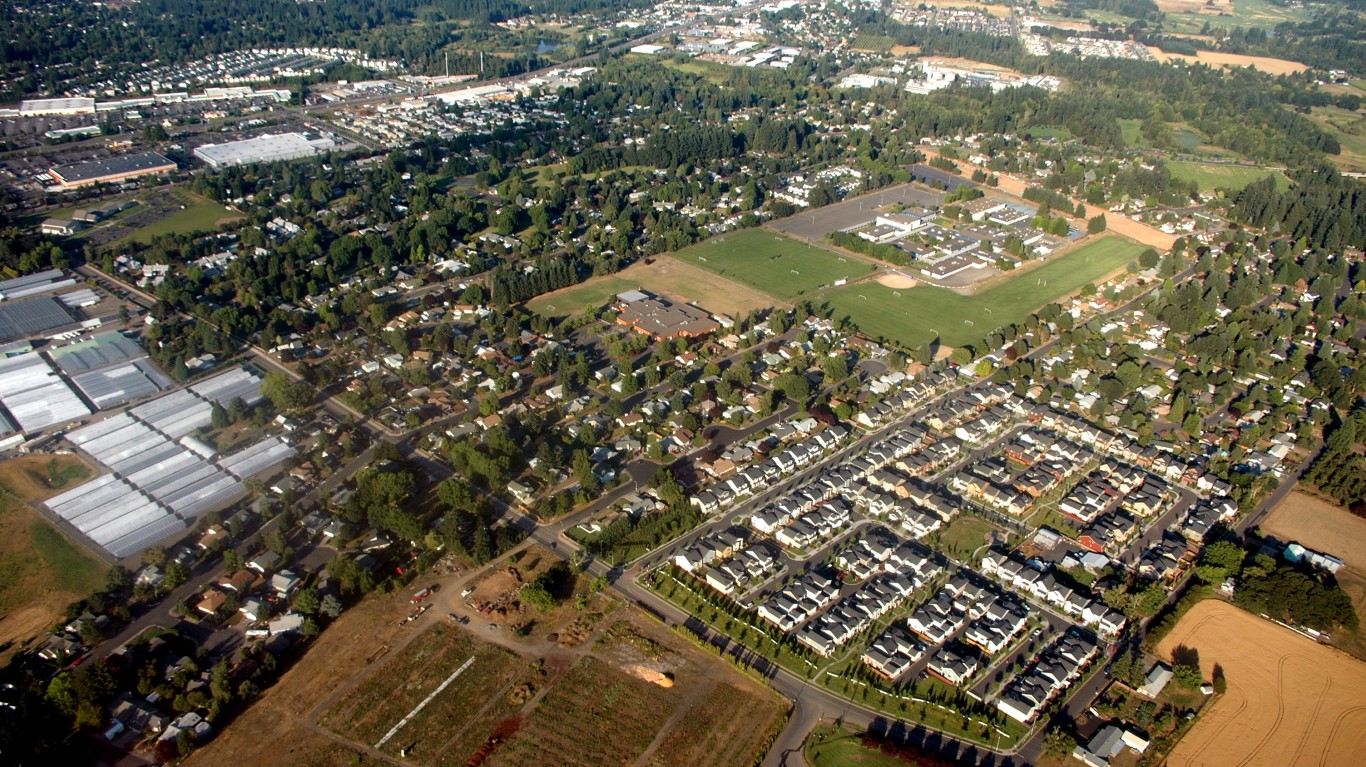
Oregon: Hillsboro
> Median household income: $86,038 (state: $67,058)
> Households earning more than $200,000: 10.3% (state: 7.1%)
> Median home value: $382,300 (state: $354,600)
> Adults with a bachelor’s degree: 40.9% (state: 34.5%)
> 2019 unemployment rate: 3.7% (state: 5.0%)
> Population: 109,120
The typical household in Hillsboro earns $86,038 a year — about $10,000 more than the typical household in Portland, the second wealthiest city in the state, and $19,000 more than the median household income across all of Oregon.
High-income areas typically have lower than average unemployment. In Hillsboro, an average of only 3.7% of the labor force was unemployed in 2019, the lowest unemployment rate of any city in the state and well below the comparable 5.0% jobless rate across Oregon.
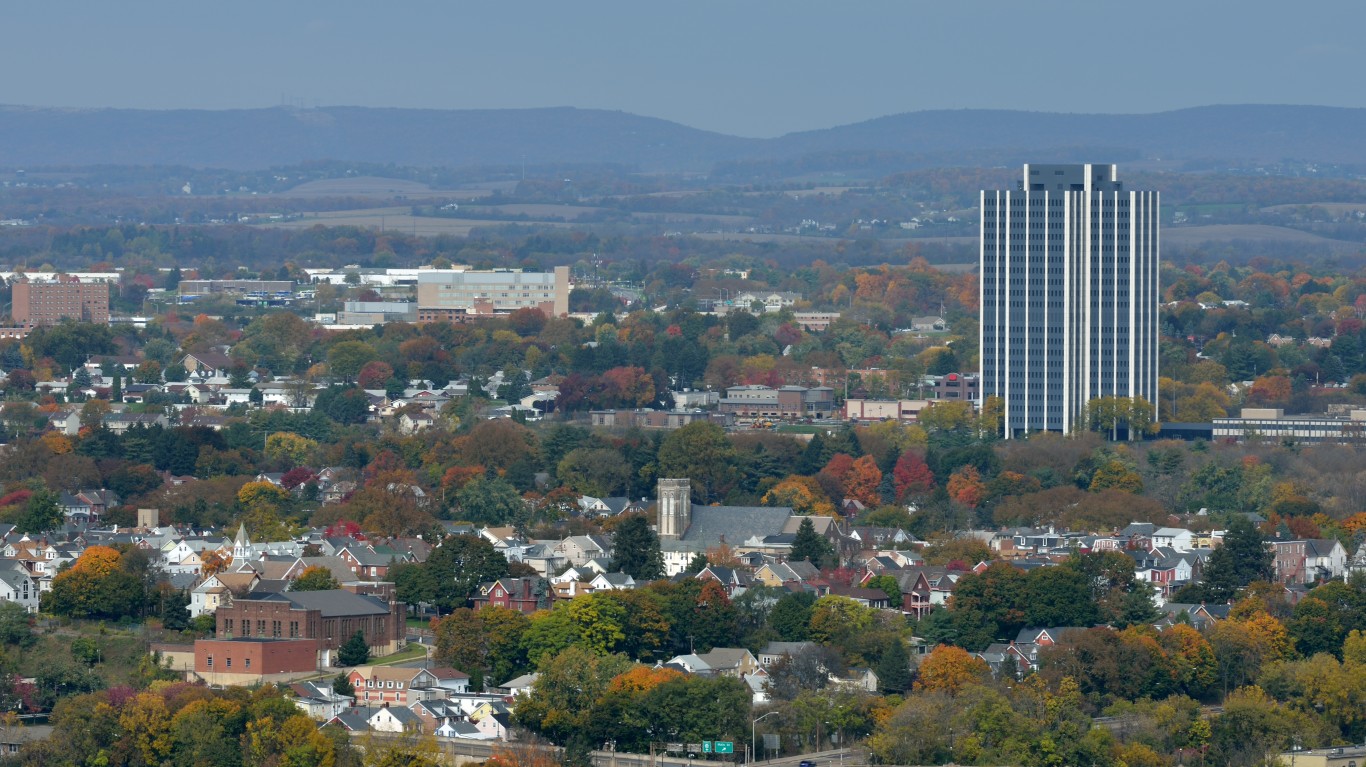
Pennsylvania: Bethlehem
> Median household income: $60,268 (state: $63,463)
> Households earning more than $200,000: 4.2% (state: 7.3%)
> Median home value: $175,300 (state: $192,600)
> Adults with a bachelor’s degree: 31.3% (state: 32.3%)
> 2019 unemployment rate: 5.5% (state: 4.5%)
> Population: 76,044
Pennsylvania has seven major cities with populations over 65,000 — none of which has a median household income above the state’s median of $63,463. With a median household income of just over $60,000, Bethlehem is the richest city in the state.
Bethlehem has a poverty rate of 12.5%, by far the lowest of any large Pennsylvania city, yet it is still just above the nationwide rate of 12.3% and the statewide rate of 12.0%. It is also the only large city in the state with a smaller than typical share of households living on $10,000 or less — 4.8% of households live on $10,000 annually, compared to 5.8% of all Americans.

Rhode Island: Warwick
> Median household income: $75,384 (state: $71,169)
> Households earning more than $200,000: 6.3% (state: 7.4%)
> Median home value: $247,500 (state: $283,000)
> Adults with a bachelor’s degree: 33.3% (state: 34.8%)
> 2019 unemployment rate: 2.0% (state: 4.2%)
> Population: 81,006
Warwick, Rhode Island, a Providence suburb that sits along Greenwich Bay, ranks as the wealthiest city in the state. The typical Warwick household earns an income of $75,384 a year, about $4,000 more than the typical Rhode Island household. As is often the case in the cities on this list, members of the labor force in Warwick are far more likely to be employed than members of the broader U.S. labor force. Unemployment in the city stood at just 2.0% in 2019, less than half the 4.2% state and 4.5% national unemployment rates, according the Census estimates.
[in-text-ad-2]

South Carolina: Mount Pleasant
> Median household income: $121,318 (state: $56,227)
> Households earning more than $200,000: 24.0% (state: 5.4%)
> Median home value: $514,800 (state: $179,800)
> Adults with a bachelor’s degree: 66.1% (state: 29.6%)
> 2019 unemployment rate: N/A (state: 4.7%)
> Population: 91,668
Mount Pleasant is by far the wealthiest city in South Carolina — its $121,318 median household income is more than double that of the state. Nearly a quarter of all households in the city earn at least $200,000 per year, and most homes in Mount Pleasant are worth over half a million dollars.
Incomes tend to rise with educational attainment, and in Mount Pleasant, nearly two-thirds of residents 25 and older hold at least a bachelor’s degree, compared to less than 30% of all South Carolina residents that age.

South Dakota: Sioux Falls
> Median household income: $61,058 (state: $59,533)
> Households earning more than $200,000: 5.8% (state: 4.5%)
> Median home value: $218,900 (state: $185,000)
> Adults with a bachelor’s degree: 36.7% (state: 29.7%)
> 2019 unemployment rate: 2.1% (state: 3.0%)
> Population: 183,799
The typical household in Sioux Falls, South Dakota, earns $61,058 a year, about $10,000 more than the median household income in Rapid City, the only other city in the state covered by the 2019 ACS, and about $1,500 more than the median income across South Dakota.
Incomes tend to rise with educational attainment, and in Sioux Falls, 36.7% of adults have a bachelor’s degree or higher, compared with 33.0% in Rapid City, and 29.7% across the state.
[in-text-ad]
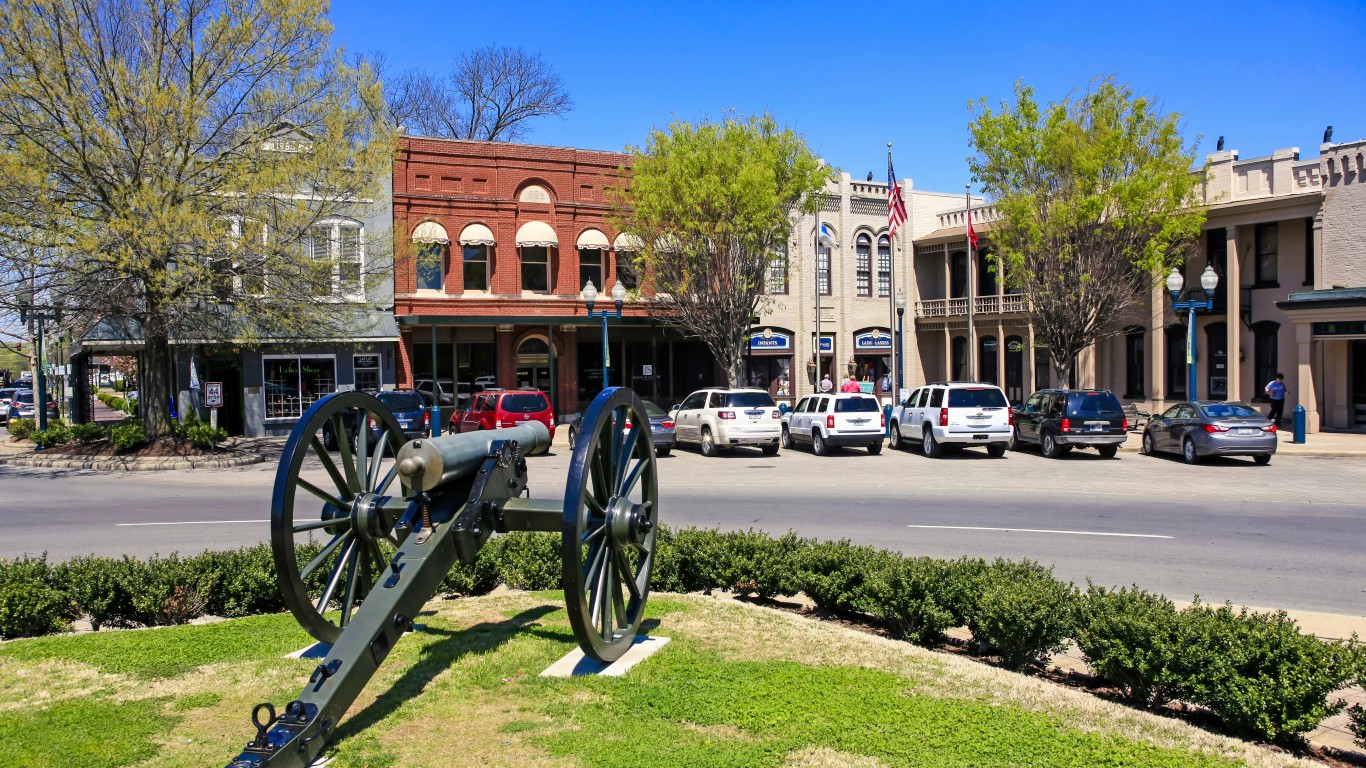
Tennessee: Franklin
> Median household income: $103,813 (state: $56,071)
> Households earning more than $200,000: 18.6% (state: 5.4%)
> Median home value: $466,400 (state: $191,900)
> Adults with a bachelor’s degree: 64.6% (state: 28.7%)
> 2019 unemployment rate: 1.3% (state: 4.5%)
> Population: 83,096
The Nashville suburb of Franklin ranks as the wealthiest city in Tennessee. Franklin is the only city in the state where most households earn an income of over $100,000 a year. The city’s median annual household income of $103,813 is about $40,000 above the median in its much more populous neighbor, the state capital.
High incomes in Franklin are supported by a strong job market. At 1.3%, the city’s 2019 unemployment rate was the lowest of any city in the state and well below the 4.5% rate across all of Tennessee.
Texas: Flower Mound
> Median household income: $139,508 (state: $64,034)
> Households earning more than $200,000: 26.0% (state: 7.9%)
> Median home value: $385,700 (state: $200,400)
> Adults with a bachelor’s degree: 61.1% (state: 30.8%)
> 2019 unemployment rate: 2.9% (state: 4.4%)
> Population: 83,205
The Dallas suburb of Flower Mound is the richest city in Texas, with a median household income of nearly $140,000, more than double the state median. The city is one of 11 large Texas cities in which most households earn more than $100,000. Flower Mound’s poverty rate of just 1.9% is a fraction of the state and national rates of 12.3% and 13.6%, respectively.
Texas’s wealthiest city has one of the most expensive real estate markets in the state as most homes in the city cost over $385,000.

Utah: South Jordan
> Median household income: $108,626 (state: $75,780)
> Households earning more than $200,000: 15.6% (state: 7.3%)
> Median home value: $475,200 (state: $330,300)
> Adults with a bachelor’s degree: 44.5% (state: 34.8%)
> 2019 unemployment rate: N/A (state: 3.2%)
> Population: 76,607
South Jordan, located just south of Salt Lake City, has the highest median household income of any city in Utah at $108,626. Property values in a given area typically reflect what local residents can afford — and in South Jordan, real estate is expensive. The typical home is worth $475,200, more than the median home value in every other city in the state. For context, the typical Utah home is worth $330,300, and the median home value nationwide is $240,500.
[in-text-ad-2]
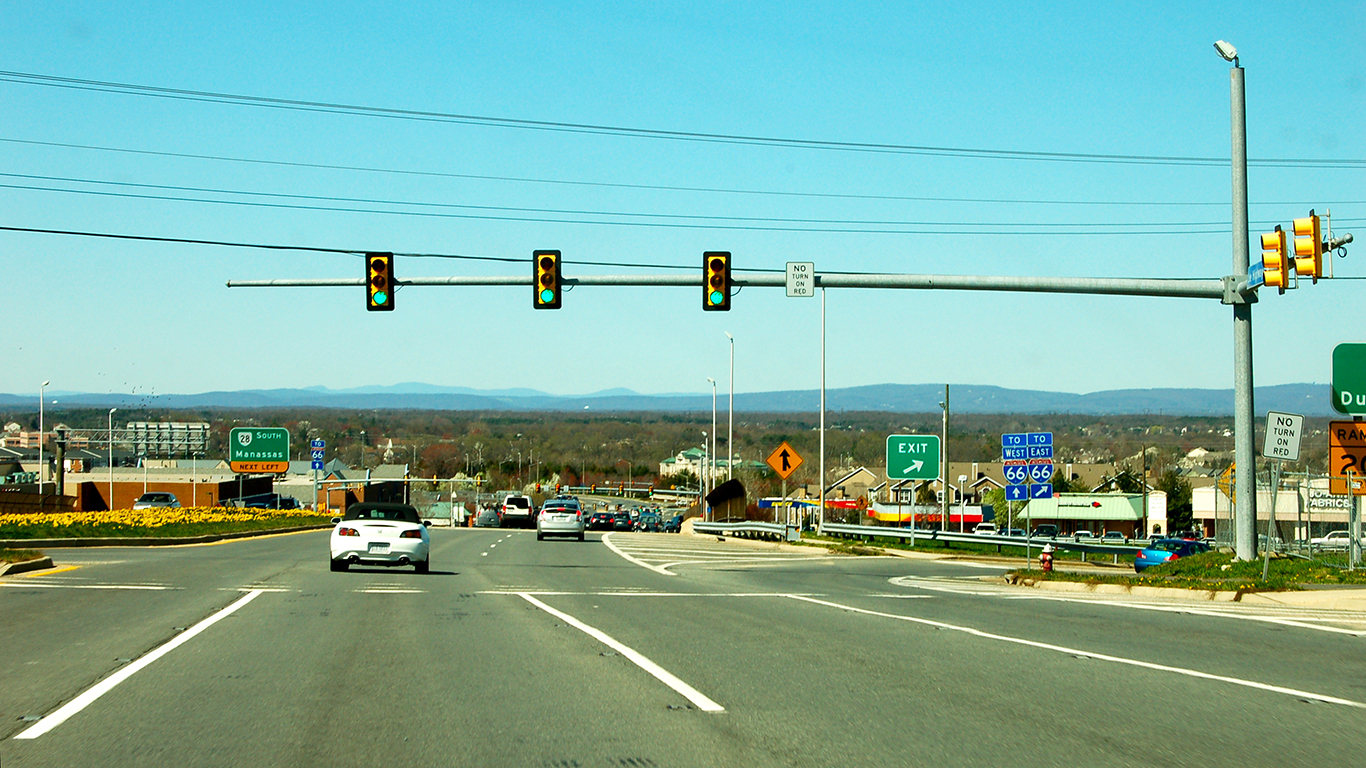
Virginia: Centreville
> Median household income: $126,859 (state: $76,456)
> Households earning more than $200,000: 23.7% (state: 11.9%)
> Median home value: $470,200 (state: $288,800)
> Adults with a bachelor’s degree: 60.0% (state: 39.6%)
> 2019 unemployment rate: 3.3% (state: 4.0%)
> Population: 66,457
Centreville is one of three major urban areas in Virginia within commuting distance of Washington, D.C. that has a median household income in excess of $100,000. Yet the median household income of $126,859 in Centreville is by far the highest of any large city or Census designated place in the state.
Though Virginia is one of the most educated states, with 39.6% of residents 25 and older holding at least a bachelor’s degree, Centreville still has a much higher educational attainment level, at 60.0%. College-educated workers tend to earn much higher wages than those without a degree.

Washington: Sammamish
> Median household income: $188,120 (state: $78,687)
> Households earning more than $200,000: 46.8% (state: 11.4%)
> Median home value: $931,700 (state: $387,600)
> Adults with a bachelor’s degree: 77.5% (state: 37.0%)
> 2019 unemployment rate: 2.9% (state: 4.6%)
> Population: 65,880
Sammamish is not only the richest city in Washington, but also the second richest city in the entire country, after San Ramon, California. The median household income of over $188,000 in Sammamish is more than double Washington’s median household income and nearly triple the U.S. median of $65,712.
Sammamish is just east of Seattle and the high-paying tech jobs in the area, which is home to companies like Amazon and Microsoft. The area’s high incomes have likely driven up real estate values, as the typical home costs over $930,000. The typical U.S. home costs just over $240,000.
[in-text-ad]

Wisconsin: Waukesha
> Median household income: $72,411 (state: $64,168)
> Households earning more than $200,000: 5.3% (state: 5.2%)
> Median home value: $234,700 (state: $197,200)
> Adults with a bachelor’s degree: 37.9% (state: 31.3%)
> 2019 unemployment rate: 2.7% (state: 3.2%)
> Population: 72,308
Incomes in Waukesha — a suburb of Milwaukee — climbed considerably last year. The typical household in the city earned $72,411 in 2019, up from $59,561 in 2018. Due to the increase, Waukesha now ranks as the wealthiest city in the state, overtaking Eau Claire, Appleton, and Madison — cities that did not report a statistically significant change in income from 2018 to 2019.
As is often the case in the cities on this list, Wisconsin’s wealthiest city also has a lower than average poverty rate. Just 10.3% of the local population lives below the poverty line, in line with the statewide poverty rate, but lowest poverty rate of any Wisconsin city and well below the 12.3% national average.
Methodology
To determine the richest city in every state, 24/7 Wall St. reviewed 2019 median household incomes for all 621 U.S. cities, towns, villages, municipalities, and Census designated places with available data from the U.S. Census Bureau’s 2019 American Community Survey. Each of these places is home to at least 61,000 people. Vermont, West Virginia, and Wyoming have no cities covered in the latest Census release and were excluded from the analysis. Data on poverty, median home value, and population are also from the ACS and are one-year estimates for 2019.
Household income includes the income of all individuals 15 years and over in the household, and is the sum of the amounts reported separately for wage or salary income; net self-employment income; interest, dividends, net rental, or royalty income; income from estates and trusts; Social Security or retirement income; Supplemental Security Income; public assistance or welfare payments; pensions; and all other income.
City boundaries are defined by the Census Bureau and adhere to the “place” geographical classification. Places can include municipalities, cities, towns, villages, and boroughs, as well as Census Designated Places, which are a statistical designation for unincorporated communities used by the Census Bureau. All figures listed are for 2019. All state figures referenced apply to the state the city is in and not the average of all states.
Take Charge of Your Retirement In Just A Few Minutes (Sponsor)
Retirement planning doesn’t have to feel overwhelming. The key is finding expert guidance—and SmartAsset’s simple quiz makes it easier than ever for you to connect with a vetted financial advisor.
Here’s how it works:
- Answer a Few Simple Questions. Tell us a bit about your goals and preferences—it only takes a few minutes!
- Get Matched with Vetted Advisors Our smart tool matches you with up to three pre-screened, vetted advisors who serve your area and are held to a fiduciary standard to act in your best interests. Click here to begin
- Choose Your Fit Review their profiles, schedule an introductory call (or meet in person), and select the advisor who feel is right for you.
Why wait? Start building the retirement you’ve always dreamed of. Click here to get started today!
Thank you for reading! Have some feedback for us?
Contact the 24/7 Wall St. editorial team.

 24/7 Wall St.
24/7 Wall St. 24/7 Wall St.
24/7 Wall St.
 24/7 Wall St.
24/7 Wall St.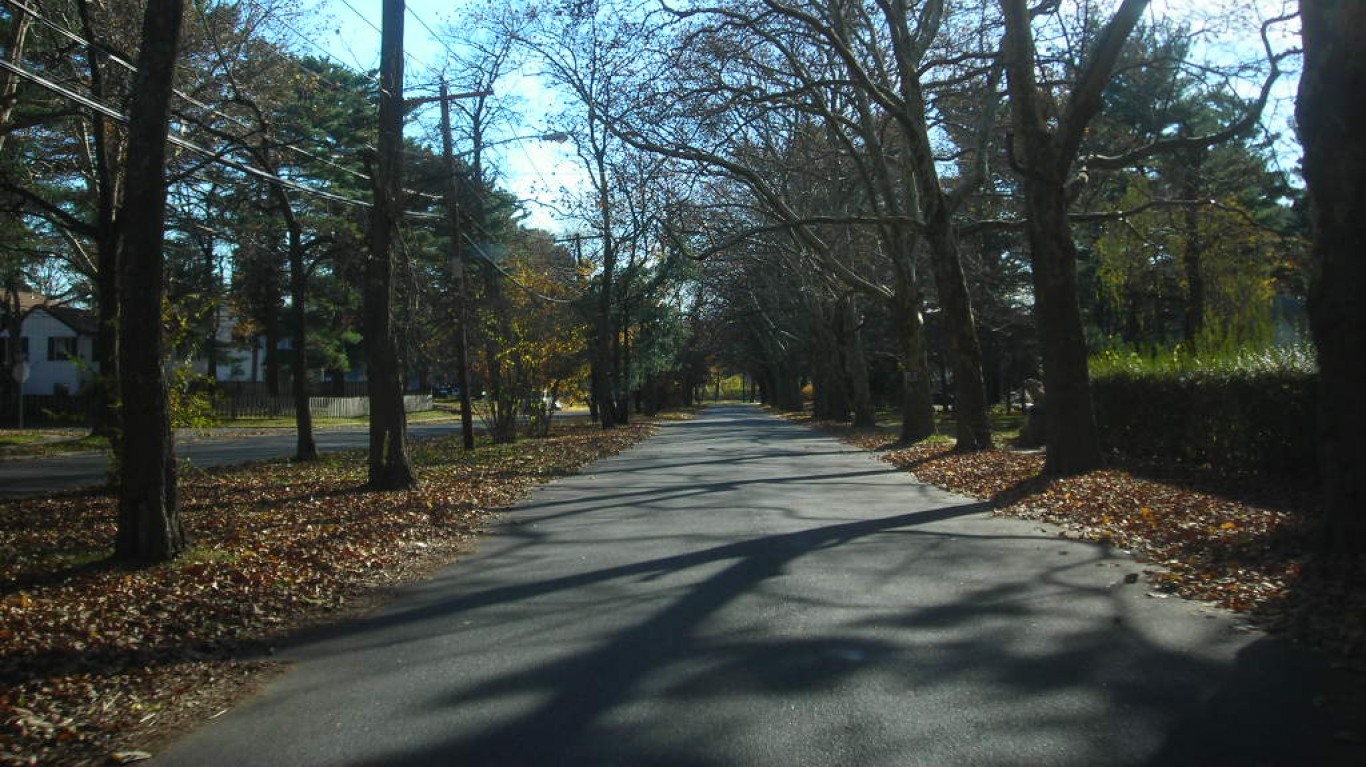
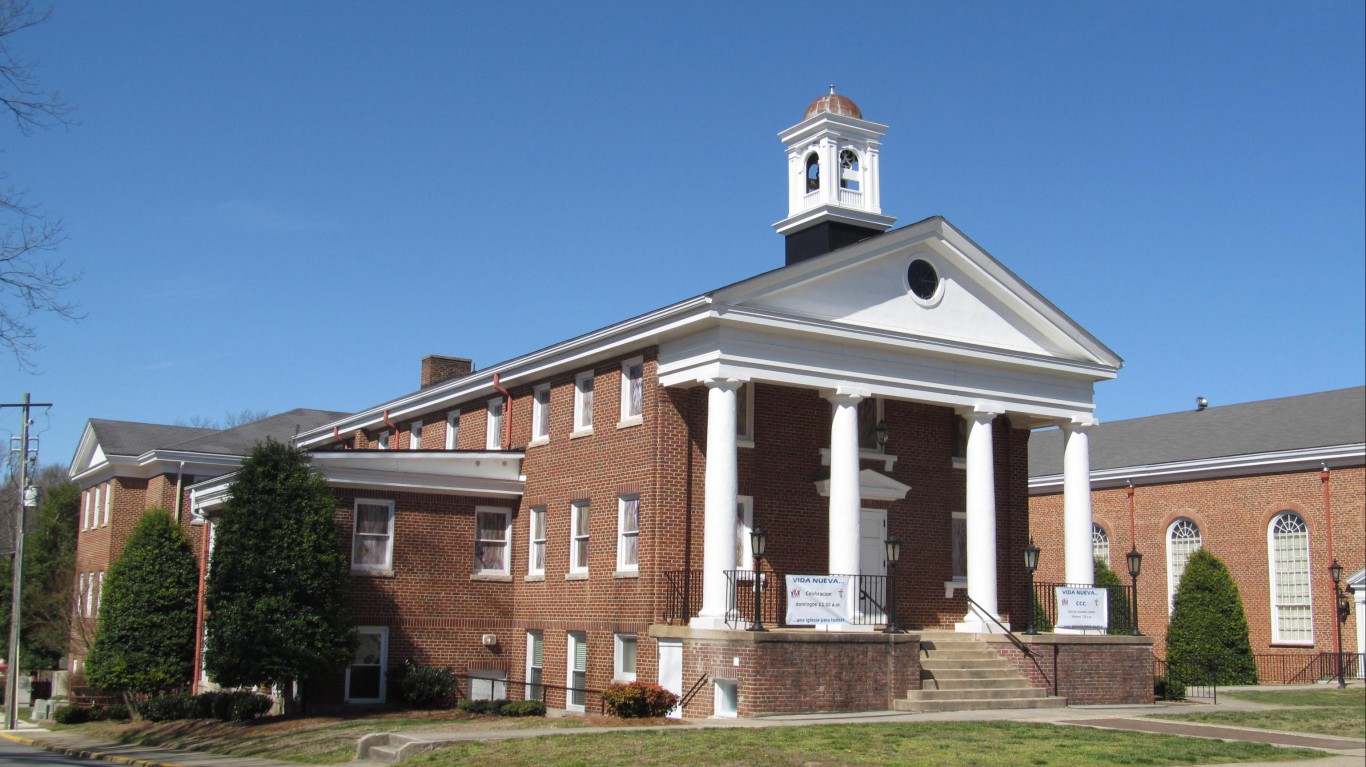
 24/7 Wall St.
24/7 Wall St.


